#he has so much understated trauma that no one seems to understand or acknowledge it's absolutely wild
Text
I feel like alice might've wanted to kick the pond in the shins but how do you kick an eldritch pond in the shins
#actually I think elliot wants to more than her#he is So Done#he has so much understated trauma that no one seems to understand or acknowledge it's absolutely wild#those were really some fighting words from him#I just. need to rewatch this a dozen times to really unpack his character it's just. wow.#and the 1814 arc?? not disappointing#like augustine? you mean THAT augustine??#“it's okay I got shot ” sksksksksk#also I have got to know what happened in that house#the amount of lore and interconnection is crazy#I lowkey feel bad for brady he doesn't get to see his daughter he doesn't understand he doesn't know that she and kat are literally#so obsessed about the past that they're basically throwing away their present!!#“don't worry about it” you should worry about it#can't trust the pond#what. an episode.#I thought tonight would be my relaxing time after a weekend full of homework. Wrong. I am a Fool.#I need two to three business days to process this#but can you blame me?? I kinda keep waiting for this to start acting like a hallmark series (you know. hallmark.) but it's not!!#oughhhh#the way home hallmark#earl crow ramblings
25 notes
·
View notes
Note
I don’t watch Holby, it just never seemed necessary.
But I want to know what al the stuff is that has to be addressed about “Sacha after Jac’s death”?
Sacha and Jac were best friends. (I assume you know Jac, as she's appeared/been mentioned on Casualty quite a lot, but in case you don't - she was clinical lead of Darwin ward for a long time, a cardiothoracic surgeon, one of Holby's most popular and long-running characters, and got misogynistically fridged in the finale despite the actress being very upset about it and wanting to move to Casualty.)
Well, "best friends" feels like understating it: they were very, very close, basically platonic soulmates, and they've said they see each other as the brother/sister respectively they never had. Jac wanted Sacha to raise her daughter for her if she died. They lived together for a fairly long while. It was a really wonderful and special friendship, I'm trying to think if there's any friendships on Casualty to compare it to but I can't think of any that reach their level. Maybe Dylan and David.
Sacha has depression, that has been really quite severe at times. In 2018, he was suicidal (and one of the stressors that caused him to feel that way was Jac being physically ill). Jac really helped him and supported him with this (and knew what it was like from experience, being mentally ill herself), to the point of inviting him to come and live with her so she could look after him.
Sacha's suffered a lot of trauma over the past few years. His longtime love/fiancee Essie (who had also helped him with his depression) passed away on their wedding day. After that, he was the victim of an abusive relationship with a woman named Jodie. The show barely let Jac help him with either of these for some reason (they even timed the Jodie storyline to coincide with Jac going on a break from the show!), which was frustrating enough, and didn't seem to care for how these things would affect Sacha's mental health.
Then they killed Jac off. Sacha only had a few weeks of even knowing that Jac was terminally ill before she died. Her last words were to him, as well. His dearest friend of over a decade died and, understandably, a lot of fans (one of them being me) were upset over how much this would cause a depression relapse for Sacha, and how he barely has anyone around to support him with both Jac and Essie dead.
It's something that really needed to be touched on IMO, when he appeared on Casualty, and it wasn't. Even a brief mention of Sacha getting counselling or going to a support group would have been something to both acknowledge how losing Jac would've affected him, and assure us that he was being supported and helped by the people around him.
I hope all that made sense, and wasn't too long an explanation or anything.
#BBC Casualty#Holby City#Sacha Levy#Casualty spoilers#asks#anons#tw;suicide mention#tw;abuse mention
11 notes
·
View notes
Text
The Ancient Magus’ Bride Revisited: Yup, It’s Still Bad
There’s something I find wholly unpleasant about the way many fans discuss The Ancient Magus’ Bride. 1) it’s the same few ideas expressed nearly verbatim and 2) it’s very centered on dismissing very troubling trends in narratives that involve toxic, abusive relationships between girls and adult men. Anyway, sit down, have a taco, this spiel might take a while.
It should go without saying that romantic relationships between teenagers and adults are always unhealthy. Ephebophilic/pedophilic relationships really shouldn’t be justified or defended. However, The Ancient Magus’ Bride tries its damnedest to portray the focal relationship as anything but inherently dangerous and as something the audience should avidly support and root for. Despite what some fans claim that the series isn’t necessarily focused on a romantic pairing between Chise and Elias, the narrative does in many ways convey a budding romance with both characters. The images below depict Chise and Elias’ intensely intimate interactions and convey rather overtly romantic overtones, and even sexual undertones at times:
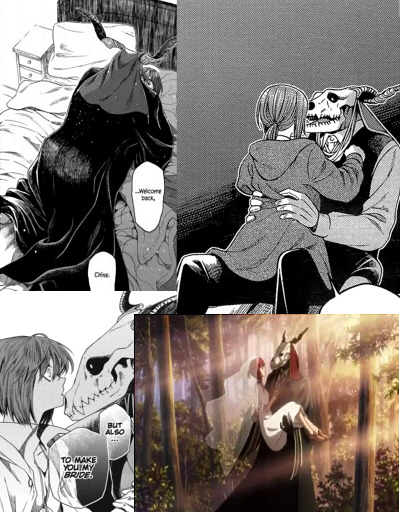
For the record, I hated putting this together. Just looking at these images make me sick. It’s so fucking gross. A 15/16-year-old girl should never be portrayed like this with a grown man, it’s revolting.
There’s no denying that there is a burgeoning romantic love between Chise and Elias and it’s one that isn’t depicted as abhorrent. Whether or not the characters are themselves aware of the romantic, sexual chemistry between them doesn’t matter because the creator knows and we the audience know better.
Another excuse often utilized by fans to condone this romance (or at least very dubious relationship) is the idea that Elias is childishly naïve; that he doesn’t really understand that he shouldn’t propose to marry a scared, traumatized teenage girl he just bought, that he doesn’t know it’s inappropriate for him to forcibly disrobe and bathe said girl, that he can’t really control his emotions and actions much like a petulant child, and so on. Firstly, it doesn’t make sense that he wouldn’t understand basic human behavior, social constructs, and standards. He’s worked alongside humans for centuries, so his ridiculously selective ignorance only exists for the author to excuse his dangerous behavior toward Chise. In fact, when Angelica rightfully admonishes him for treating Chise poorly, Elias’ reaction indicates he knew what he did was wrong.
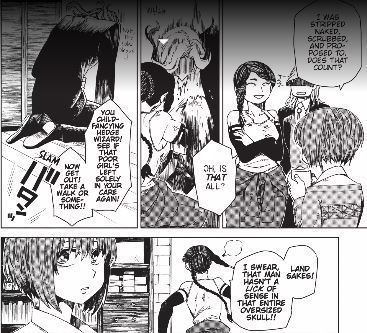
Elias just bought a teenage girl as a slave, proposed to her, and forcibly undressed and bathed her. Now, he’s being called a pervert for doing all that! Isn’t human trafficking and child grooming hilarious!! ROFL!!!11!!😂🤣😭🤮
Elias’ feigned naiveté is a clumsy attempt to make him palatable and sympathetic, and while I would like to say it failed it clearly hasn’t. Most viewers and readers are more than willing to infantilize “bonehead” Elias to defend or understate his actions.
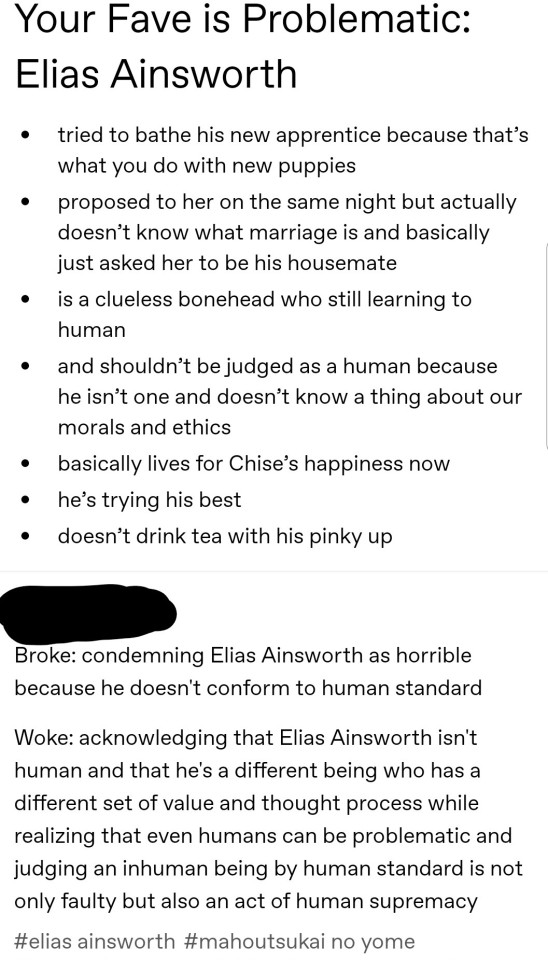
Goddammit! Human Supremacy strikes again!!! Elias said non-human monster rights!!! I am the Wokest of all, you see!!!!
Despite how little sense it makes in-universe, even if Elias doesn’t understand the implications of proposing to a girl, the creator understands, and the audience understands that Elias x Chise is the endgame. Why else would it be called “The Ancient Magus’ Bride”? Though no matter how hard the creator and fans try to coddle and baby Elias while supporting his forced, noxious relationship with Chise, all I see is a manipulative, possessive man who’s gradually grooming a vulnerable 15-year-old girl into his ideal future bride. Still other fans, while they don’t necessarily infantilize Elias, they treat Elias and Chise as if they’re virtually equals. Nevertheless, despite these fans’ insistence, the pair are not on equal footing in their hazardously dysfunctional relationship. It really doesn’t matter that Chise occasionally scolds Elias and stands up to his abuse, because she has very little control of their relationship (i.e., she’s a child, he bought her, he’s a more experienced magic user, he has an established career, a luxurious home, etc.) and unless she leaves him permanently, her safety will never be guaranteed. Their relationship is too riddled with unsettling power imbalances, stemming mostly from Chise being a child, far too many for them to be even remotely compatible.
Even if the story had avoided that innate nastiness of child grooming, Elias is still very possessive and manipulative. If ephebophilia/pedophilia weren’t enough of a red flag with him, the writer had to make the slow burn between Elias and Chise even more sickening with Elias’ controlling and domineering tendencies. While fans argue that his behavior is acknowledged as detrimental, as Chise leaves him for some time as a result. However, fans fail to consider how his actions should have ended the relationship, permanently; Chise should never have returned to him. Even when “called out” nothing will ever change the fact that he BOUGHT her and that she is, technically his SLAVE. He didn’t save her from servitude or worse by being a “good” master. It’s despicable that this story tries to make human trafficking and enslavement seem like it’s justifiable. Also, Elias continues to spy on Chise, claim that she is his as if she’s an object, and generally discourages her from engaging with others. He destroyed college admission offers for Chise! He almost killed a child due to his possessiveness of Chise!!! He even seemingly almost eats Chise because of his maniacal jealousy???

Excerpt from Wikipedia episode synopsis: “Chise becomes afraid Elias may be about to eat her and sends a distress signal to Ruth. [...] Chise realises Elias is jealous of Stella and having a childish temper tantrum.” This fucker physically assaults her, but sure it’s just “a childish temper tantrum,” because he’s a violent man-baby who can’t control himself. Fuck this godforsaken pile of shit.
These actions can’t be forgiven or dismissed like a partner who tends to forget anniversaries, is a bit of a braggart and know-it-all, borrows clothes without asking or some other minor flaw. No, these are HUGE red flags that read “GET OUT WHILE YOU STILL CAN.” Not only is he controlling, but he also claims to not be able to control his most primal and destructive urges if he doesn’t get what he wants. There are predatory people who act exactly like Elias. Abusive people who claim that they can’t control their fits of anger that result in physical, psychological, and emotional trauma. These abusers’ behavior can’t be “fixed” by those they abuse; it shouldn’t be Chise’s responsibility to repair a broken, troubled yet extremely dangerous man who wants to wife her up. This isn’t some obstacle to be overcome by the pair, it’s a clear reason for Chise to remove him from her life. The best outcome for Chise would be to get away from an absolute menace like Elias. Plain and simple. Though of course that’s obviously not going to happen, because it is a wretched nightmare of a story.
I know I’m not the first person to express all these ideas about The Ancient Magus’ Bride, and I know I won’t be the last. It’s just that direct rebuttals to typical fan assertions are lacking whenever critics of the series take issue with its flaws regarding the main characters and their interactions. Anyway, this was my take on the most common defenses of Elias Ainsworth and his reprehensible relationship with Chise Hatori which is so central to the plot of the series. Now pardon me while I...
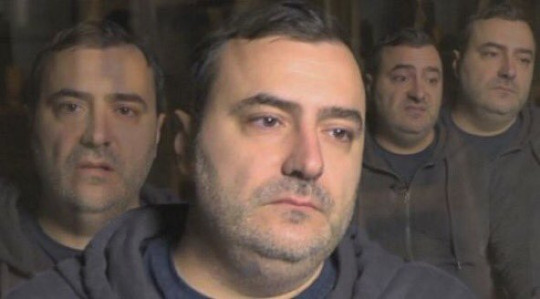
#the ancient magus bride#ancient magus bride#tamb#Mahoutsukai no Yome#The Ancient Magus' Bride#venting
75 notes
·
View notes
Text
An Avenging Dragon
A Storm of Swords is the second big push Daenerys gets on her path to becoming a much darker person; at the end of A Game of Thrones she is hatching dragons, but her plot pauses substantially in A Clash of Kings. While she is in a higher position, travelling through the Red Waste and staying in Qarth doesn’t give her an opportunity to actually lead her people that much; she still leads them in more subtle and understated ways, but A Storm of Swords puts her back in a position to take military action. Back in the Lhazareen village, Daenerys did not have the stomach to be the conqueror she tried to be, and in this book we see how she’s grown and changed since hatching her dragons.
Bred For War
The first two books establish a very strong symbolic connection between Daenerys and her dragons, and hint at an actual physical link between them, but A Storm of Swords is the first book to really expand on the concept.
Throughout the book, there is countless examples of Daenerys’ mood actively translating to her dragons. They are particularly in touch with Daenerys’ passionate emotions; whenever Daenerys get angry with someone, her dragons also stir:
Her dragons sensed her fury. Viserion roared, and smoke rose grey from his snout. Drogon beat the air with black wings, and Rhaegal twisted his head back and belched flame
Dany felt hot tears on her cheeks. Drogon screamed, lashing his tail back and forth.
And when Daenerys is having sex with Irri, her dragons seem to experience it with her:
Still, the relief she wanted seemed to recede before her, until her dragons stirred, and one screamed out across the cabin
She screamed then. Or perhaps that was Drogon.
Daenerys and her dragons have become so interchangeable that she herself can’t tell one from the other.
This very tangible connection she has with them works on two different levels; it highlights that Dany’s dragons want what she wants, and also works to strengthen the symbolic connection she shares with them. By making this emotional connection explicit, GRRM strengthens the parallels between Daenerys and her dragons that are meant to be subtext. As the dragons begin to really grow, they develop personalities and traits that reflect on Daenerys:
At first Groleo had wanted the dragons caged and Dany had consented to put his fears at ease, but their misery was so palpable, that she soon changed her mind and insisted they be freed.
He was always hungry, her Drogon.
Daenerys’ dragons hate being held back in any way; they aren’t happy until they can soar over the ocean, free to hunt and fly wherever they want. This doesn’t fully pay off until Daenerys chains them at the start of A Dance with Dragons, but GRRM is seeding that being chained is something that both the dragons and Daenerys will hate.
It also feeds into the larger narrative point that Daenerys herself is a dragon. She herself starts to realize this as time passes, and she grows more and more comfortable equating herself to one. Back in A Game of Thrones, she called herself “the blood of the dragon”, and when she compared herself to a dragon, it was often in symbolic terms, in a removed sort of way. She still does that in A Storm of Swords, but she is also much more direct in her language when she says she is a dragon:
“I have a dragon’s temper, that’s all. You must not let it frighten you.”
The anger was fierce and hot inside her when she gave the command; it made her feel like an avenging dragon
She had not meant to be so sharp with Ser Jorah, but his endless suspicion had finally woken her dragon.
“YOU ARE THE DRAGON’S NOW!”
And not only is she comfortable directly stating she is a dragon, she uses it to excuse her behavior; especially in the context of Jorah “waking her dragon”. Not that it is at all wrong for Daenerys to lash out at Jorah, considering his abhorrent behavior toward her; but that particular phrase is something Daenerys is familiar with because Viserys used it as both a threat and a justification. It’s a way for Daenerys to excuse her outbursts as a right she has as a Targaryen; dragons can do whatever they want, and can’t be held accountable for the things they do.
Looking beyond the connection Daenerys has to her own dragons, the history of House Targaryen is starting to become ominously present within her chapters. I’ll get into Old Valyria and Aegon’s Conquest more below, but this particular line about the Targaryen’s dragons is very interesting:
“the dragons the Seven Kingdoms knew best were those of House Targaryen. They were bred for war, and in war they died. It is no easy thing to slay a dragon, but it can be done.”
Daario is introduced in this book, and with him the idea of Daenerys having to choose between peace or war, so this quote seems particularly damning for the choices she will make.
As Daenerys’ connection to her House grows, the parallels she shares with her brother Rhaegar also start to become apparent. Jorah always said that Rhaegar was the last dragon, before he saw Daenerys step out of Drogo’s Pyre, and as the books go on it’s made clear that the title of “the last dragon” is really hers. She is fascinated by her brother, and even dreams of herself standing in his shoes:
That night she dreamt that she was Rhaegar, riding to the Trident. But she was mounted on a dragon, not a horse. When she saw the Usurper’s rebel host across the river they were armored all in ice, but she bathed them in dragonfire and they melted away like dew and turned the Trident into a torrent.
And when she is trying to work up her courage to turn Drogon and the Unsullied against the Great Masters, she thinks to herself “It is time to cross the Trident”. Unlike Viserys, who Daenerys had to live under and experience his cruelty, Rhaegar is just a story to her; someone who can be as brave and heroic, as Romantic and honorable, as inspiring as she needs him to be.
In many ways, Rhaegar represents all the same things to Daenerys that Westeros does. Just as she cannot acknowledge the possibility of fault in Westeros (“She tried to imagine what it would feel like, when she first caught sight of the land she was born to rule. It will be as fair a shore as I have ever seen, I know it. How could it be otherwise?”), Daenerys also sees Rhaegar as flawless; instead of placing blame on him for running away from Elia Martell and his children, she asks Ser Barristan just how awful Elia was to make him abandon her. Part of why she feels so uncomfortable buying the Unsullied to fight for her as slaves, is because Rhaegar’s men followed him out of love and loyalty, which leads to Jorah Mormont’s famous line:
“Tell me, then-when he touched a man on the shoulder with his sword, what did he say? ‘Go forth and kill the weak’? At the Trident, those brave men Viserys spoke of who died beneath our dragon banners-did they give their lives because they believed in Rhaegar’s cause, or because they had been bought and paid for?” Dany turned to Mormont, crossed her arms, and waited for an answer.
“My queen,” the big man said slowly, “all you say is true. But Rhaegar lost on the Trident. He lost the battle, he lost the war, he lost the kingdom, and he lost his life. His blood swirled downriver with the rubies from his breastplate, and Robert the Usurper rode over his corpse to steal the Iron Throne. Rhaegar fought valiantly, Rhaegar fought nobly, Rhaegar fought honorably. And Rhaegar died.”
I find this argument between Jorah and Daenerys so important because we’re definitely not supposed to agree with Jorah. The idea that Rhaegar’s honor got him killed flies in the face of why he had to fight at the Trident to begin with; that he had run off from his wife with a young girl, and refused to stand against his father’s tyranny. Yet it also highlights Daenerys’ continued lack of understanding of what Robert’s Rebellion or Westeros really is; Daenerys specifically asks Jorah what Rhaegar said when he knighted men, the implication being that the men Rhaegar chose to knight were honorable and good. But we know that the greatest tragedy that befell Dany’s family during Robert’s Rebellion, the rape and murder of Elia Martell and her children, was carried out by Ser Gregor Clegane, who was knighted by none other than Prince Rhaegar Targaryen.
Knowing Daenerys shares such a strong connection to her brother, it makes the details we know of Rhaegar’s personality very interesting:
“Perhaps so, Your Grace.” Whitebeard paused a moment. “But I am not certain it was in Rhaegar to be happy.”
“You make him sound so sour,” Dany protested.
“Not sour, no, but. . . there was a melancholy to Prince Rhaegar, a sense. . .” The old man hesitated again.
“Say it,” she urged. “A sense. . . ?”
“. . . of doom. He was born in grief, my queen, and that shadow hung over him all his days.”
Melancholic is a very apt way to describe Daenerys in A Storm of Swords. Whether it be fear of betrayal, a profound sense of loneliness, the trauma of her past, or any other number of worries, Daenerys is incredibly sad throughout her chapters. She often finds herself crying, set off by small things, and she doesn’t even understand what drove her to tears. Similar to Rhaegar, I’m not certain Daenerys has it in her to be happy. The struggle between Dany who wants to live in a house with a red door, and Daenerys Targaryen who wants to be a Queen and Conqueror, is such a huge part of her story and in A Storm of Swords and A Dance with Dragons, is expressed through Daenerys having to choose peace or war. As we saw in A Game of Thrones and A Clash of Kings, choosing peace wasn’t enough for her; she could not let herself live as a khaleesi, or return and rule Vaes Tolorro. But when she chooses war, she isn’t particularly satisfied with that either:
Up here in her garden Dany sometimes felt like a god, living atop the highest mountain in the world.
Do all gods feel so lonely? Some must, surely.
The red priests believed in two gods, she had heard, but two who were eternally at war. Dany liked that even less. She would not want to be eternally at war.
The way Barristan Selmy describes Rhaegar as being shadowed by grief his entire life is also very true of Daenerys, and reminiscent of the Undying Ones calling her daughter of death. Her mother died giving birth to her, she was named “Stormborn” because her father’s fleet was crushed on the night of her birth, and her entire arc is shrouded in death; whether that be Viserys, Rhaego, or Drogo. And as Barristan says of Rhaegar, what I’ve been trying to outline in these metas is just how much a sense of doom follows Daenerys Targaryen.
Bricks & Blood
Daenerys’ complex relationship to slavery is driven to the forefront of her story when she arrives in Slaver’s Bay. While it has always been present in her story, from her first chapter when she was sold to Khal Drogo, it isn’t really the focus until she goes to Astapor to buy the Unsullied. It’s such an interesting part of her story, because it highlights both the best and worst of her personality; it gives her a chance to chase the ideal of being the Breaker of Chains, but also really shines a light on how little she understands what she’s doing, and how little patience she has to actually be a savior.
There is a lot of focus placed on the middle and end of Daenerys’ arc in A Storm of Swords, but it’s important to consider how she began her journey to Slaver’s Bay: to buy a slave army. Trying to argue the exact moment Daenerys decided to burn Kraznys and free the Unsullied is pointless, because GRRM writes her as intentionally vague in Astapor to keep the element of surprise, but it’s inarguable that she arrives there with the intent to buy the Unsullied:
“If Magister Illyrio would deny you, he is only Xaro Xhoan Daxos with four chins. And if he is sincere in his devotion to your cause, he will not begrudge you three shiploads of trade goods. What better use for his tiger skins than to buy you the beginnings of an army?
That’s true. Dany felt a rising excitement.
. . .
“Yes,” she decided. “I’ll do it!” Dany threw back the coverlets and hopped from the bunk. “I’ll see the captain at once, command him to set course for Astapor.”
And once she’s in Astapor, Daenerys is clearly torn on what decision to make. Barristan and Jorah act as the angel and devil on her shoulder, and through her debate with them we can see how and why Daenerys makes her choices. When she is faced with Barristan’s steadfast refusal of the Unsullied as a potential army, we get to see Daenerys arguing for the buying of slaves, and I find her justifications quite interesting:
“There are sellswords in Pentos and Myr and Tyrosh you can hire. A man who kills for coin has no honor, but at least they are no slaves. Find your army there, I beg you.”
“My brother visited Pentos, Myr, Braavos, near all the Free Cities. The magisters and archons fed him wine and promises, but his soul was starved to death. A man cannot sup from the beggar’s bowl all his life and stay a man. I had my taste in Qarth, that was enough. I will not come to Pentos bowl in hand.”
For Daenerys, it doesn’t matter how wrong slavery is or how negatively it will be received in Westeros, because it cannot be worse than having to beg. In her mind, she believes that having to beg the rich men of the Free Cities to help him caused Viserys to become the cruel monster he was, and Daenerys thinks that the same could happen to her; which implies that Daenerys sees Viserys’ reaction as either valid or inevitable – either way, it’s troubling.
What’s also troubling is how Daenerys uses her past to justify her present actions:
“Better to come a beggar than a slaver,” Arstan said.
“There speaks one who has been neither.” Dany’s nostrils flared. “Do you know what it is like to be sold, squire? I do. My brother sold me to Khal Drogo for the promise of a golden crown. Well, Drogo crowned him in gold, though not as he had wished, and I. . . my sun-and-stars made a queen of me, but if he had been a different man, it might have been much otherwise. Do you think I have forgotten how it felt to be afraid?”
The concept of slavery does not bother Daenerys, the brutality does. I briefly mentioned when I wrote about her A Clash of Kings chapters that Daenerys doesn’t think twice about Xaro’s slaves, which seems to be at odds with her actions in Slaver’s Bay; but I think this is because Daenerys isn’t really opposed to owning people, as long as they are treated well. She can buy a slave army, because she would treat them well, so it wouldn’t be wrong. But once she arrives in Astapor, and has to see the way the men are treated, she can’t lie to herself about her actions anymore. But, just as she did in the Lhazareen village, Daenerys tries to overcome horrific violence to continue in her actions:
She was feeling faint. The heat, she tried to tell herself.
She can’t bring herself to ignore the suffering of the Unsullied, though, as her fight with Jorah shows:
“How many men do they have for sale?”
“None.” Was it Mormont she was angry with, or this city with its sullen heat, its stinks and sweats and crumbling bricks? “They sell eunuchs, not men. Eunuchs made of brick, like the rest of Astapor. Shall I buy eight thousand brick eunuchs with dead eyes that never move, who kill suckling babes for the sake of a spiked hat and strangle their own dogs?
“If you were my true knight, you would never have brought me to this vile sty.”
But it is dark below, in the streets and plazas and fighting pits. And it is darkest of all in the barracks, where some little boy is feeding scraps to the puppy they gave him when they took away his manhood.
“The blood of my enemies I will shed gladly. The blood of innocents is another matter. Eight thousand Unsullied they would offer me. Eight thousand dead babes. Eight thousand strangled dogs.”
Seeing the dehumanization of the Unsullied makes Daenerys feel physically sick. Being exposed to that extreme level of cruelty stirs something in Daenerys; she has high ideals of what a King or Queen is for, and seeing so many abused people makes her want to stand up and fight for them. I’ll get into Daenerys’ version of justice more later, but I think it’s very important to understand how she sees herself. Freeing the Unsullied is in no way altruistic – it allows her to get everything she wants and lose nothing – but Daenerys doesn’t do it for entirely selfish reasons. This is how the scene is described:
She raised the harpy’s fingers in the air. . . and then she flung the scourge aside. “Freedom!” she sang out. “Dracarys! Dracarys!”
She believes she’s setting the Unsullied free, she’s singing out the words: Freedom!
But that’s not entirely true. Before she sets the Plaza ablaze, Daenerys specifically asks Kraznys about it:
“The Good Master has said that these eunuchs cannot be tempted with coin or flesh,” Dany told the girl, “but if some enemy of mine should offer them freedom for betraying me. . .”
“They would kill him out of hand and bring her his head, tell her that,” the slaver answered. “Other slaves may steal and hoard up silver in hopes of buying freedom, but an Unsullied would not take it if the little mare offered it as a gift. They have no life outside their duty. They are soldiers, and that is all.”
“It is soldiers I need,” Dany admitted.
Daenerys is being told in no uncertain terms that the Unsullied are trained not to understand the concept of freedom. And, by her own actions, we can see that she believed Kraznys:
She stood in her stirrups and raised the harpy’s fingers above her head for all the Unsullied to see. “IT IS DONE!” she cried at the top of her lungs. “YOU ARE MINE!” She gave the mare her heels and galloped along the first rank, holding the fingers high. “YOU ARE THE DRAGON’S NOW! YOU’RE BOUGHT AND PAID FOR! IT IS DONE! IT IS DONE!”
Daenerys makes sure the Unsullied know that she is their Master now, screaming it as loud as she can and waving the Harpy high above her for them to see, before giving the command for them to sack Astapor. Not until after they obey, does she drop the scourge. Again, Daenerys loves the idea of liberating people and she loves a version of freedom, but she doesn’t fully understand what slavery is.
A part of her is uncomfortable with her actions, though, and that comes through the most in her interaction with her handmaiden Irri. When she was khaleesi to Khal Drogo, Daenerys’ two handmaidens were her slaves, and even though she set them free at the end of A Game of Thrones, Irri doesn’t fully understand what that means:
Dany stepped away from her. “No. Irri, you do not need to do that. What happened that night, when you woke . . . you’re no bed slave, I freed you, remember? You . . .”
“I am handmaid to the Mother of Dragons,” the girl said. “It is great honor to please my khaleesi.”
When Daenerys hears this, it does not please her:
"I don't want that," she insisted. "I don't."
On some level, Daenerys understands that having sex with Irri is exploitative and wrong:
For a moment Dany was tempted, but it was Drogo she wanted, or perhaps Daario. Not Irri. The maid was sweet and skillful, but all her kisses tasted of duty.
But we’ll see in A Dance with Dragons that Daenerys continues to have sex with Irri.
I want to pause for a moment and explain why I say that Irri and the Unsullied don’t understand what their new found freedom means. I am not trying to infantilize them or remove their agency. But years and years of dehumanization and abuse have tried to take their agency from them; the Unsullied are violated, tortured, drugged, and emotionally and psychologically manipulated from the time they are little boys, all with the goal of stripping them of the very concept of self. That level of emotional damage can’t be solved by simply setting them free, especially when they’re given the option to live in their old patterns. While we don’t have details about Irri’s upbringing, we know that she was a slave Viserys was able to buy specifically to serve Daenerys, and spent a year or more of her life as Dany’s slave. So, on top of the trauma inflicted on Irri and the Unsullied through years of being told their lives were not their own, there is the added layer of them actually being Daenerys’ property at a point in their lives. It is one thing to be treated as property your whole life, and then someone comes along and tells you that you’re now free; it is quite another for someone who also treated you like property to then give you your freedom. Daenerys is, even if unintentionally, taking advantage of the slaves she freed.
This complicated relationship to slavery also gives Daenerys yet another connection to her Targaryen - and Valyrian - heritage. When she arrives in Astapor, she remembers how the Valyrians destroyed the empire of Old Ghis:
Old Ghis had fallen five thousand years ago, if she remembered true; its legions shattered by the might of young Valyria, its brick walls pulled down, its streets and buildings turned to ash and cinder by dragonflame, its very fields sown with salt, sulfur, and skulls.
Lore from The World of Ice and Fire expands on this, clarifying that the “Freehold” of Valyria learned slavery from the conquered cities of Old Ghis, and their first slaves were the Ghiscari they had taken prisoner. Similar to her ancestors, Daenerys quickly starts to profit off of selling slaves:
Dany thought a moment. "Any man who wishes to sell himself into slavery may do so. Or woman." She raised a hand. "But they may not sell their children, nor a man his wife."
"In Astapor the city took a tenth part of the price, each time a slave changed hands," Missandei told her.
"We'll do the same," Dany decided. Wars were won with gold as much as swords. "A tenth part. In gold or silver coin, or ivory. Meereen has no need of saffron, cloves, or zorse hides."
Daenerys is careful to put boundaries around men selling themselves into slavery, trying to avoid people being forced back into the slave trade, but she is equally quick to make a profit off of the trade. Now that Daenerys is directly benefiting from the selling of slaves, she has less of a reason to discourage it. It’s also unsettling how she hears of how Astapor ruled, the city responsible for the atrocities of the Plaza of Punishment, and decides we’ll do the same. Like her ancestors, Daenerys is starting to fall into the patterns of Ghis and their slave trade. She is still far from being the same as the men she hates, but she is profiting off the buying and selling of human beings, which is morally bankrupt. She could have allowed the men to sell themselves back into slavery without taking ten percent, but instead she chose to follow the example set by Astapor.
Valyria and the cities of Slaver’s Bay are extremely intertwined, and Daenerys deciding to adopt Astapor’s slave tax is just one in a long list of similarities. Before Old Ghis was conquered by the Freehold of Valyria, they were in the slave trade but had an elite source of free fighting men; then Valyria salted the very ground Ghis was built upon, and adopted their people as slaves to send into the volcanic mines, where so many slaves died it would “defy comprehension”; after Valyria drowned in the Fourteen Flames, the cities of Old Ghis were reborn as Slaver’s Bay, now with no willing men to fight for them, and thus created the Unsullied. The two empires feed off each other in a twisted cycle of human suffering (one could almost say Valyria helped create a wheel?) where one is never better than the other, and only grow more similar. By the time Daenerys comes to Astapor, the Ghiscari don’t even have their language anymore and instead speak Valyrian.
The old rhyme Barristan Selmy tells Daenerys really highlights how similar the two empires became:
"Bricks and blood built Astapor," Whitebeard murmured at her side, "and bricks and blood her people."
"What is that?" Dany asked him, curious.
"An old rhyme a maester taught me, when I was a boy. I never knew how true it was. The bricks of Astapor are red with the blood of the slaves who make them."
The meaning of the rhyme is not hard to see; the slaves are the ones who built Astapor brick by brick, the very stones stained in their blood.
Knowing why Valyria took slaves – so they could work the fire mines – it is incredibly easy to make this rhyme about the Freehold:
Fire & Blood built Valyria, and fire and blood her people.
While Daenerys is far removed from the atrocities of both the Valyrians and the Ghiscari, she fails to understand how her own people helped to create the environment in which Slaver’s Bay could exist. In her mind, the six battles Valyria fought with Old Ghis is a legend of her people’s greatness, and that Valyria was somehow better than the people it conquered. One could almost argue the opposite was true, though, since they took the Ghiscari and sent them to work slave mines inside literal active volcanoes. Daenerys doesn’t know the history of her people, of her house (who brought their slaves with them to Dragonstone), so when she conquers cities in the name of House Targaryen, as the blood of Old Valyria, she doesn’t understand what she’s saying. But she is actively benefiting from an empire that served to make Essos an even worse place than they found it.
I Am Only A Young Girl, And Do Not Know the Ways of War
A Clash of Kings gave Daenerys a taste of what being a Queen was going to be, but A Storm of Swords throws her into it. Between the moments that Daenerys loves, such as setting the Plaza of Punishment afire or being named Mhysa, she has to deal with the actual day to day of leading a people. We get to see her in political situations, making diplomatic negotiations, and making policy for her people. This is the book that gives us the first real taste of what Daenerys could or would be like as Queen of the Seven Kingdoms. And I think we start to see why Daenerys shouldn’t be Queen of the Seven Kingdoms. She loves the feeling of being a leader to her people, but the actual role she has to play as Queen is so incredibly boring to her.
After conquering Astapor, Daenerys is faced with the question of how to take Yunkai. She doesn’t want to abandon all the slaves in the city, but she also does not want to risk the lives of her men and she knows they don’t have the supplies to last a siege. Smartly, Daenerys decides to meet with the commanders of the sellsword companies and also envoys from Yunkai; but her behavior during her meeting does more harm than good:
“I say, you are mad.”
“Am I?” Dany shrugged, and said, “Dracarys.”
The dragons answered. Rhaegal hissed and smoked, Viserion snapped, and Drogon spat swirling red-black flame. It touched the drape of Grazdan’s tokar, and the silk caught in half a heartbeat. Golden marks spilled across the carpets as the envoy stumbled over the chest, shouting curses and beating at his arm until Whitebeard flung a flagon of water over him to douse the flames. “You swore I should have safe conduct!” the Yunkish envoy wailed.
“Do all the Yunkai’i whine so over a singed tokar?”
We learn in A Dance with Dragons that this is used against her quite often, and not entirely unfairly. She swore the men would have safe conduct, and then turned her dragons against them. No real damage was done, but it leaves a lasting impression on the men who were there. And Daenerys has no real reason to threaten him in that manner; her dragons are too small to threaten the safety of a city, and she is trying to propose a nonviolent conquering of the city. She does it because her temper is raised, and Grazdan said she was mad. I don’t think it’s bad that Daenerys has such a heavy disdain for the men of Slaver’s Bay, considering how they treat her and even more so how they treat their slaves, but she tries to have it both ways; offering to meet with them and give them safe passage, and also insulting and attacking them. She tries to be the kind of Queen who can meet with her enemies, but she can never follow through.
When she arrives outside the gates of Meereen, Daenerys is given another opportunity to try her hand at politics, and this is her in her element. The champion that Meereen sends is Oznak zo Pahl, a highborn pit fighter, and Daenerys has to carefully decide who she is willing to send to face him; Greyworm, Jorah, and Daario are all eager to prove their bravery and impress her, but Daenerys knows none of them are the right choice:
“Strong Belwas was a slave, here in the fighting pits. If this highborn Oznak should fall to such the Great Masters will be shamed, while if he wins . . . well, it is a poor victory for one so noble, one that Meereen can take no pride in.” And unlike Ser Jorah, Daario, Brown Ben, and her three bloodriders, the eunuch did not lead troops, plan battles, or give her counsel. He does nothing but eat and boast and bellow at Arstan. Belwas was the man she could most easily spare. And it was time she learned what sort of protector Magister Illyrio had sent her.
Where the peace of politics does not sit right with her, Daenerys is incredibly smart and intuitive when it comes to war and conquest. Her choosing Strong Belwas as her champion was a well-made decision and the best she could have made. But it also highlights something about Daenerys personality, which being Queen exacerbates; there is almost a thoughtlessness to how Daenerys sends Belwas out to die for her. Daenerys has an incredible amount of loyalty to those who follow her, especially after they proclaim her Mhysa, but she also has less concern for people when they are not loyal to her. There is a thread that connects all the people Daenerys loves the most, from the people who follow her, to Ser Jorah, to Daario; they live for her. She is capable and often loves and shows sympathy for people who aren’t centered around her, but Daenerys is attached to the idea of being a savior. Daenerys invests in people when they invest in her. That in and of itself is not a bad thing; but she invests so much in certain people that she seems to almost forget the lives of others.
That becomes incredibly destructive when she becomes Queen of Meereen, because it’s symptomatic of how self-centric her worldview is, but the full weight of that isn’t explored until A Dance with Dragons. There is small hints of how Daenerys can treat people sometimes, though, such as this:
Irri had been sleeping at the foot of her bunk (it was too narrow for three, and tonight was Jhiqui’s turn to share the soft featherbed with her khaleesi)
Daenerys lets one of her handmaidens sleep on the floor every night. Not because she’s being cruel or malicious, but because she doesn’t seem to notice how uncomfortable that must be for them. Unintentionally, Daenerys takes advantage of her position of power by allowing people to do things like sleep on the floor or go out to die for her, and does not think twice about these decisions. Being in a position of power, especially being a Queen in a medieval setting, puts people in a position where they have control over other people’s lives and their deaths, so when Daenerys has to make these choices, she should approach them with a great weight. And sometimes, often even, she does; but there are noticeable slips, moments where she outweighs the lives she controls, that are slightly alarming. A Dance with Dragons gets into this aspect of Daenerys a lot more, but it’s been present in all her chapters and A Storm of Swords is no exception.
Mhysa
So much of Daenerys’ arc is about her family, legacy, and motherhood. She is constantly being pulled in two different direction in life, whether that be by outside forces or her own internal monologue, and who she chooses to mother is no different. Her two identities, Mother of Dragons and Mhysa, stand at odds with each other.
Mirri Maz Duur telling Daenerys that she can’t have children impacts her hugely, and she invests in her dragons as if they were her children:
She felt very lonely all of a sudden. Mirri Maz Duur had promised that she would never bear a living child. House Targaryen will end with me. That made her sad. “You must be my children,” she told the dragons, “my three fierce children. Arstan says dragons live longer than men, so you will go on after I am dead.”
So much of what drives Daenerys is the idea that she’s alone in the world, that no one else is like her. House Targaryen will end with me. The way she bonds with her dragons is her attempt at having children, giving herself a future that can outlive her. She becomes fiercely protective and maternal over them:
At first Groleo had wanted the dragons caged and Dany had consented to put his fears at ease, but their misery was so palpable, that she soon changed her mind and insisted they be freed.
And she watches them learn and grow with tremendous pride:
Viserion’s scales were the color of fresh cream, his horns, wing bones, and spinal crest a dark gold that flashed bright as metal in the sun. Rhaegal was made of the green of summer and the bronze of fall. They soared above the ships in wide circles, higher and higher, each trying to climb above the other.
The joy she gets as they learn the command “dracarys” or watches them fly for the first time, is like a parent. Her dragons are the only children she will ever have, and she is determined to love them more than anything in the world. And beyond just being a mother, they become her identity; back in A Game of Thrones she thought to herself “daughter of dragons, bride of dragons, mother of dragons”. She thinks that she wants them to be her legacy when she dies, but they already are; everything she does is because of them. Just the idea of giving Drogon away makes her feel sick:
It was a wretched thing she did. The Mother of Dragons has sold her strongest child. Even the thought made her ill.
By the time she has told Kraznys this lie, that’s all it is; she never intended to sell Drogon. Saying the words, hollow as they were, is enough to turn her stomach. Her dragons are everything to her, even her identity.
And then she arrives outside the gates of Yunkai:
Dany felt a lightness in her chest. I will never bear a living child, she remembered. Her hand trembled as she raised it. Perhaps she smiled. She must have, because the man grinned and shouted again, and others took up the cry. “Mhysa!” they called. “Mhysa! MHYSA!” They were all smiling at her, reaching for her, kneeling before her.
Suddenly there are thousands of people, cheering, screaming, that she is their mother. These people that she liberated, that she saved, are now looking up to her like they’re her children. She has more than the dragons now; she has a people that are hers.
By the time we get to A Dance with Dragons, even though she tries not to, Daenerys just hates these people. She hates their city, she hates their culture, she hates all the things they’ve taken from her. But to understand how she ends up so miserable, you have to see just how much she loved them and was willing to give up for them:
The raggle-taggle host of freedmen dwarfed her own, but they were more burden than benefit. Perhaps one in a hundred had a donkey, a camel, or an ox; most carried weapons looted from some slaver’s armory, but only one in ten was strong enough to fight, and none was trained. They ate the land bare as they passed, like locusts in sandals. Yet Dany could not bring herself to abandon them as Ser Jorah and her bloodriders urged. I told them they were free. I cannot tell them now they are not free to join me. She gazed at the smoke rising from their cookfires and swallowed a sigh. She might have the best footsoldiers in the world, but she also had the worst.
Already there’s hints of Daenerys’ frustration, but she refuses to leave them behind. Even though they’re quickly eating through her food supplies, eating off the land so quickly she can’t gain more, and almost none of them can actually fight for her, she lets them come with her. And when taking Meereen without a slaughter seems impossible, Daenerys’ men again advise her to abandon all the people she brought with her from Astapor and Yunkai, but she refuses:
Dany had left a trail of corpses behind her when she crossed the red waste. It was a sight she never meant to see again. “No,” she said. “I will not march my people off to die.” My children.
She rides out among them, so they can see her and get strength from her:
If it helps give them courage, let them touch me, she thought. There are hard trials yet ahead. . .
The language of that is incredibly similar to the House of the Undying, when Daenerys is giving her life to the screaming crowd before it turns into the Undying Ones stealing it from her. I’ll get into it more later, but Daenerys is so in love with her people, her children, that she decides to stay in Meereen for them.
So she has these two identities, one belonging to her dragons and the other to her people. She doesn’t have to choose yet, but the stage has been set for Daenerys to make a choice; is she going to mother thousands of poor and enslaved people, or the three dragons that saved her life in the Dothraki Sea?
Do All Gods Feel So Lonely?
As the books go on, even though Daenerys begins to surround herself by more people and close companions, she only feels more alone. As I mentioned before, Daenerys is in many ways the product of tragedy; tragedies that have left her feeling alone and cut off from everyone else. And becoming a khaleesi and leading thousands of people takes her feelings of loneliness and turns them into something else, more like paranoia; and as people betray her and attempts are made against her life, those feelings only grow.
So much of her childhood was running from place to place, the only constant in her life being Viserys; and the older she gets, and the more distance she puts between that time in her life and where she is now, she loses that image of Viserys she had:
“I was alone for a long time, Jorah. All alone but for my brother. I was such a small scared thing. Viserys should have protected me, but instead he hurt me and scared me worse. He shouldn’t have done that.”
She still tries desperately to cling to the good memories she has of him, though:
Viserys had been stupid and vicious, she had come to realize, yet sometimes she missed him all the same. Not the cruel weak man he had become by the end, but the brother who had sometimes let her creep into his bed, the boy who told her tales of the Seven Kingdoms, and talked of how much better their lives would be once he claimed his throne.
The only other person that Daenerys sees as dependable in her life is Ser Jorah Mormont; but A Storm of Swords sees her emotionally cutting ties with him, too. In A Clash of Kings, the seeds for it were planted, as Daenerys felt slightly betrayed in the way he saw her; as a child or a woman, but never a Queen. Daenerys was willing to look past that, and give him time to see her for the Queen that she wants to be; but then he takes advantage of her, treating her as child he can take advantage of as a woman:
“And my vest-” she started to say, turning.
Ser Jorah slid his arms around her.
“Oh,” was all Dany had time to say as he pulled her close and pressed his lips down on hers. He smelled of sweat and salt and leather, and the iron studs on his jerkin dug into her naked breasts as he crushed her hard against him. One hand held her by the shoulder, while the other slid down her spine to the small of her back, and her mouth opened for his tongue, though she never told it to. His beard is scratchy, she thought, but his mouth is sweet. The Dothraki wore no beards, only long mustaches, and only Khal Drogo had ever kissed her before. He should not be doing this. I am his queen, not his woman.
While it is obvious that Daenerys is made incredibly uncomfortable by Jorah’s advances, the way she explains it to herself is not entirely honest:
“I . . . that was not fitting. I am your queen.”
“My queen,” he said, “and the bravest, sweetest, and most beautiful woman I have ever seen. Daenerys-”
“Your Grace!”
She is quick to remind Jorah, and herself, that what he did was wrong because she is his Queen. But it becomes clear as the chapters go on that Daenerys is really feeling a different sort of betrayal:
Dany could feel tears welling in her eyes, sudden and unwanted. Her hand flashed up and cracked Ser Jorah hard across the face. It was either that, or cry.
Mormont touched the cheek she'd slapped. "If I have displeased my queen—"
"You have. You've displeased me greatly, ser. If you were my true knight, you would never have brought me to this vile sty." If you were my true knight, you would never have kissed me, or looked at my breasts the way you did, or . . .
Daenerys is still a young girl, 15 or 16, and Jorah is a grown man leering at her. And while she doesn’t entirely understand what she’s feeling, because she was raised in a society where that sort of thing is widely accepted and she was sold to the highest bidder at 13, it’s clear that Daenerys feels used and taken advantage of sexually by Jorah. She’s in a unique position within the story, because she is the only woman we see who is in a position of power above their abuser. And while the entire foundation of their society has taught Daenerys to accept behavior like that as a woman, being a Queen gives her an outlet for her rage. She can’t let herself be mad at Jorah as the little girl he’s being sexually aggressive with, but she can punish him as his Queen:
He should never have done that. He is thrice my age, and of too low a birth for me, and I never gave him leave. No true knight would ever kiss a queen without her leave. She had taken care never to be alone with Ser Jorah after that, keeping her handmaids witth her aboard ship, and sometimes her bloodriders. He wants to kiss me again, I see it in his eyes.
While she hasn’t fully lost Jorah yet, the growing divide between them makes Daenerys feel very alone:
It was a long, dark, windy night that followed. Dany fed her dragons as she always did, but found she had no appetite herself. She cried awhile, alone in her cabin, then dried her tears long enough for yet another argument with Groleo.
But this betrayal of Daenerys by Jorah isn’t quite tangible; Daenerys hardly understands what she feels and why feels it, and almost thinks of herself as irrational in her anger toward him. Not until she finds out about his political betrayal, something she can point to and see exactly how he could have hurt her, does she banish him out of her life.
At the start of the book, Daenerys has already had two attempts against her life and is understandably paranoid:
Ser Jorah saved me from the poisoner, and Arstan Whitebeard from the manticore. Perhaps Strong Belwas will save me from the next.
Not only does this tell us that Daenerys fears another attempt on her life (which she’s right to worry over), but it also comes at the end of a long argument she has with herself over how likely Arstan Whitebeard and Strong Belwas are to betray her. (It’s also a nice piece of foreshadowing, considering Belwas will eventually save her from a poisoner). Daenerys is starting to see enemies all around.
Yet, just as when the poisoner at the market and the Sorrowful Man with the manticore tried to kill her, Daenerys does not see the next attempt at her life coming:
Dany had stopped to speak to a pregnant woman who wanted the Mother of Dragons to name her baby when someone reached up and grabbed her left wrist. Turning, she glimpsed a tall ragged man with a shaved head and a sunburnt face. "Not so hard," she started to say, but before she could finish he'd yanked her bodily from the saddle. The ground came up and knocked the breath from her, as her silver whinnied and backed away. Stunned, Dany rolled to her side and pushed herself onto one elbow . . .
The man who tries to kill her, Mero, tells her this:
“There’s the treacherous sow,” he said. “I knew you’d come to get your feet kissed one day.”
He’s using the kindness Daenerys has, her willingness to ride out amongst her people to give them hope, and turning it against her. And in her mind, this is not the first time that has happened. When she tried to save Eroeh and instead she was raped and murdered, when she put trust in Mirri Maz Duur only to get Drogo and Rhaego killed, all of these times she tries to do something good it falls apart. In A Storm of Swords, Daenerys will still fight and try to save people, but this book helps to set up for when she eventually breaks.
And later the same day, Daenerys learns the full truth of both Arstan Whitebeard and Jorah:
“Before I took Robert’s pardon I fought against him on the Trident. You were on the other side of that battle, Mormont, were you not?” He did not wait for an answer. “Your Grace, I am sorry I misled you. It was the only way to keep the Lannisters from learning that I had joined you. You are watched, as your brother was. Lord Varys reported every move Viserys made, for years. Whilst I sat on the small council, I heard a hundred such reports. And since the day you wed Khal Drogo, there has been an informer by your side selling your secrets, trading whispers to the Spider for gold and promises.”
The weight of Jorah’s betrayal, made even worse by the small lies Ser Barristan has been telling, hits Daenerys like a pile of bricks. She was nothing but good to him – she was going to take him home! And he still sold her to the Usurper and his dogs; the person she trusted most in the world still betrayed her. I find it interesting that Daenerys does not let her anger and hurt fully overwhelm her until Jorah confesses that he told Robert Baratheon that she was pregnant with Khal Drogo’s baby; the rage she feels at him for putting Rhaego in harms way is in some way misplaced at anyone other than herself, since she is the one who put her baby in reckless danger chasing the ghost of Khal Drogo.
After Daenerys learns of Jorah’s betrayal, she can’t go back to the way she was before. Suddenly, whereas before she was rightfully paranoid but often trusting, she is just waiting for someone to betray her next. The prophecies of the House of the Undying weigh on her, and everywhere she turns she sees a traitor in waiting:
Daario and Ben Plumm, Grey Worm, Irri, Jhiqui, Missandei. . . as she looked at them Dany found herself wondering which of them would betray her next.
And it starts to affect the way she treats people:
"I am going to take you home one day, Missandei," Dany promised. If I had made the same promise to Jorah, would he still have sold me? "I swear it."
Is this an act of genuine kindness, a heartwarming promise Dany is making to see Missandei feel safe on Naath? Or is Daenerys just trying to avoid another betrayal? We don’t get to know a definitive answer to this because Daenerys doesn’t know herself.
Justice . . . That's What Kings Are For
This is the first book where Daenerys has some real agency to make choices as a Queen or Khaleesi, and we see the shape of her ruling philosophy start to take form. And she does have some great ideas about how Kings and Queens should rule, and what kind of justice they should make for their subjects. But there is also a darker side to how she wields her power; a harsh, rash, childish cruelty that looks less like justice and more like violence for the sake of violence.
Daenerys wants to be a benevolent Queen, and strives to be as fair as she can be:
“A queen must listen to all,” she reminded him. “The highborn and the low, the strong and the weak, the noble and the venal. One voice may speak you false, but in many there is always truth to be found.” She had read that in a book.
As well as listening to the both the high and lowborn, Daenerys still believes in the idea of justice:
He wasn’t just my brother, he was my king. Why do the gods make kings and queens, if not to protect the ones who can’t protect themselves?”
“Some kings make themselves. Robert did.”
“He was no true king,” Dany said scornfully. “He did no justice. Justice. . . that’s what kings are for.”
On the surface, this sounds like a strong moral philosophy for a Queen to have. The responsibility Kings, Queens, and Lords had, the social contract, was to protect the people below them; to use their unmatched power to protect the weak and keep the strong in check. Kings are for justice.
But Daenerys is already showing a double standard; she refused to call Robert Baratheon a king because he “did no justice”, but she still gives the title to Viserys – even though she thinks he was vicious and cruel. Viserys did no justice, and Daenerys knows that better than anyone. So why does he get to be a King? Because he’s a Targaryen. Daenerys really does try to be benevolent and fair, but it always runs up against the way she views herself and her family. Before Barristan reveals his true identity to her, he tries to tell the truth about her father as gently as he can, and Daenerys cannot hear it:
Whitebeard did his best to hide his feelings, but they were there, plain on his face. “His Grace was. . . often pleasant.”
“Often?” Dany smiled. “But not always?”
“He could be very harsh to those he thought his enemies.”
“A wise man never makes an enemy of a king,” said Dany.
Even though she can see the discomfort plain on Arstan’s face, Daenerys chooses to place blame on the men who challenged her father.
Daenerys’ thoughts on Kings and Queens often seem equal parts reassuring and discomforting. For every good thought she has, an equally worrying one chases right after:
“Only lies offend me, never honest counsel.” Dany patted Arstan’s spotted hand to reassure him. “I have a dragon’s temper, that’s all. You must not let it frighten you.”
Her being open to council and disagreement sets her apart from many of the tyrants we’ve seen elsewhere in the story. But the way she excuses her temper is concerning. Barristan offered well meaning council, and was met with a rather aggressive put down from Daenerys; even though she says that honest council could never offend her, she hardly gives Barristan reason to give it. And when Barristan desperately tries to talk her out of selling Drogon to Kraznys, she again rebukes him:
Whitebeard stared in shocked disbelief. His hand trembled where it grasped the staff. “No.” He went to one knee before her. “Your Grace, I beg you, win your throne with dragons, not slaves. You must not do this thing.”
“You must not presume to instruct me. Ser Jorah, remove Whitebeard from my presence.”
“Whitebeard,” she said, “I want your counsel, and you should never fear to speak your mind with me. . . when we are alone. But never question me in front of strangers. Is that understood?”
Daenerys is not entirely wrong; it is not the best look as a Queen if your advisors are openly disagreeing with you. But Barristan only disagreed with her publicly because she had given him no choice to do it privately; Daenerys did not tell anyone of her plans in Astapor. From Barristan’s perspective, Daenerys is about to sell the single most valuable item in the entire world to buy an army of slaves, which he knows Westeros will not take kindly to. And not only does he believe this is a political misstep, he has made it clear to Dany that it is morally abhorrent. When he questions her, he does not do it from a place of superiority; he gets down on one knee and begs her to change her mind. Daenerys also shows him no sympathy, even though she knows he is right; she was never going to sell Drogon, never. I understand her putting on a show for Kraznys and the slavers so they don’t catch on to her game, but in private she has no reason to be so harsh to Barristan for voicing a belief she herself holds.
While Daenerys’ talk of justice sounds appealing for a monarch, the way she actually carries it out is less enchanting. When Kraznys is demonstrating how strong the Unsullied are, he shows her a grave example of their ferocity:
He stopped before a thickset man who had the look of Lhazar about him and brought his whip up sharply, laying a line of blood across one copper cheek. The eunuch blinked, and stood there, bleeding.
Daenerys has to stop him from hitting the man again, and is horrified by the inhuman response of the Unsullied, who are drugged and conditioned not to feel pain. So when she holds the whip instead of Kraznys, Daenerys doesn’t hesitate to hurt him the same way:
“There is a reason. A dragon is no slave.” And Dany swept the lash down as hard as she could across the slaver’s face. Kraznys screamed and staggered back, the blood running red down his cheeks into his perfumed beard.
There is something wholly righteous about this anger, a certain release in seeing someone hurt in the same way they hurt others. But the way in which it doesn’t matter to Daenerys is what gives me pause:
The harpy's fingers had torn his features half to pieces with one slash, but she did not pause to contemplate the ruin. "Drogon," she sang out loudly, sweetly, all her fear forgotten. "Dracarys."
The black dragon spread his wings and roared.
A lance of swirling dark flame took Kraznys full in the face. His eyes melted and ran down his cheeks, and the oil in his hair and beard burst so fiercely into fire that for an instant the slaver wore a burning crown twice as tall as his head. The sudden stench of charred meat overwhelmed even his perfume, and his wail seemed to drown all other sound.
This is written very similar to when Daenerys steps inside Drogo’s funeral pyre. In that chapter, Daenerys is too focused on the beauty of the dancing flames, the screams of Mirri Maz Duur and her people in the background less important to her. And here it is the same; there is one moment where Kraznys’ screaming drowns out everything else, his face burning with fire high into the air, but it is hardly enough to grab Daenerys’ attention.
When Daenerys is 163 miles from the gates of Meereen, she sees another horror as bad as the Plaza of Punishment:
Worst of all, they had nailed a slave child up on every milepost along the coast road from Yunkai, nailed them up still living with their entrails hanging out and one arm always outstretched to point the way to Meereen. Leading her van, Daario had given orders for the children to be taken down before Dany had to see them, but she had countermanded him as soon as she was told. "I will see them," she said. "I will see every one, and count them, and look upon their faces. And I will remember."
And, rightly, Daenerys cannot let this horror go unpunished:
Dany set great store by Ser Jorah's counsel, but to leave Meereen untouched was more than she could stomach. She could not forget the children on their posts, the birds tearing at their entrails, their skinny arms pointing up the coast road.
But the way Daenerys punishes the Great Masters seems frighteningly unlike justice:
“I want your leaders," Dany told them. "Give them up, and the rest of you shall be spared."
"How many?" one old woman had asked, sobbing. "How many must you have to spare us?"
"One hundred and sixty-three," she answered.
She had them nailed to wooden posts around the plaza, each man pointing at the next. The anger was fierce and hot inside her when she gave the command; it made her feel like an avenging dragon. But later, when she passed the men dying on the posts, when she heard their moans and smelled their bowels and blood. . .
Dany put the glass aside, frowning. It was just. It was. I did it for the children.
Daenerys has no idea how many “leaders” Meereen has. It could be any number more or less than 163; there could be dozens of men complicit in the crucifixions of the children who are free in the city, or a dozen men who knew nothing of the children nailed upon a cross for someone else’s crimes. She also leaves it up to the Great Masters of Meereen to choose the 163 men she will crucify; there is a chance that they were honest in who committed the crime, but it seems much more likely that the Great Masters picked the least respected of them to give to Daenerys.
A part of Daenerys knows what she did was wrong, though:
Dany remembered the horror she had felt when she had seen the Plaza of Punishment in Astapor. I made a horror just as great, but surely they deserved it. Harsh justice is still justice.
But Daenerys was not after justice, she was after revenge. Her crucifying the Great Masters is very similar to when Ned refused to let Loras Tyrell go after The Mountain in the Riverlands:
Ned looked down on him. From on high, Loras Tyrell seemed almost as young as Robb. "No one doubts your valor, Ser Loras, but we are about justice here, and what you seek is vengeance." He looked back to Lord Beric. "Ride at first light. These things are best done quickly." He held up a hand. "The throne will hear no more petitions today."
Vengeance isn’t entirely wrong, but it is much more dangerous than justice. Daenerys did not consider her actions, did not make sure the right men paid for the crime; she picked an entirely arbitrary number, 163, and an equal number of arbitrary men and killed them. The Great Masters are infinitely more culpable in their deaths than innocent children ever could be, but Daenerys decided to play by their own rules in serving them “justice”. There is something harshly satisfying about that; but something equally disquieting, too.
And, going back to the connection she shares with her dragons, this passage stands out:
"They have been wild while you were gone, Khaleesi," Irri told her. "Viserion clawed splinters from the door, do you see? And Drogon made to escape when the slaver men came to see them. When I grabbed his tail to hold him back, he turned and bit me." She showed Dany the marks of his teeth on her hand.
Irri was watching the dragons while Daenerys had her fight with Jorah. So, when Daenerys is angry, her dragons are increasingly volatile; ending in someone innocent getting hurt.
It’s also incredibly interesting to me, what Daenerys is able to handle and what she isn’t. When her men first see the crucified children, Daario, Barristan, and Jorah try to have them taken down before Daenerys can see; but she demands the dead children stay on their crosses, so she can see every single one and remember. She didn’t want to shy away from the cruelty of Meereen and the Great Masters, and instead wanted to see it firsthand for when she would be in a position to get justice. Yet Daenerys doesn’t have the stomach for this:
“Viserys was a child, and the queen sheltered him as much as she could. Your father always had a little madness in him, I now believe. Yet he was charming and generous as well, so his lapses were forgiven. His reign began with such promise. . . but as the years passed, the lapses grew more frequent, until. . .”
Dany stopped him. “Do I want to hear this now?”
When it was someone else’s horror, Daenerys understood why she needed to see the crucified children; she wanted to know, so she could make those men pay. But when it comes to her own father, Daenerys doesn’t want to know, and won’t let Barristan tell her. The vague idea of her father being mad, of knowing she needs to be careful with her own thoughts, is enough for her; the shocking cruelty, the details of the men Aerys murdered, is not important. Daenerys does not give Westeros the same curtesy she gives Meereen, because the monsters that tormented the Seven Kingdoms share a sigil with her.
The Face of A Conqueror
All of the different directions Daenerys is pulled in this book, and all her chapters really, comes back to a simple choice she has to make: to be the girl who lived in a house with a red door, or to be Daenerys Targaryen, of the blood of kings and conquerors. I think the problem a lot of people have when reading her chapters, is the assumption that it’s one choice to make, but in reality, it’s a series of choices. Like I said when I wrote about her A Game of Thrones chapters, the arc of a real person is not as clean as a traditional “narrative arc”; real people make good and bad choices, try to be better, backslide, rinse, repeat. I think Daenerys choosing to kill Mirri Maz Duur to birth her dragons sealed her fate in the way that her dragons were such a tangible thing, so real to her, that no matter what she would always go back to them. But that doesn’t mean that Daenerys doesn’t try exceptionally hard to be different. The end of her arc in A Storm of Swords is unique because it’s the only time (so far) where she has ended on the choice not to be Daenerys Stormborn.
In A Storm of Swords, Daenerys is trying desperately to be seen as a Queen and not a child:
“I am not a child,” she told him. “I am a queen.”
And even her line of being a young girl who doesn’t understand war, is about how Daenerys does not want to be seen that way; it’s an overly humble and self-deprecating line, something both her and her enemies know she doesn’t mean. It still works because the men of Slaver’s Bay are horribly sexist and will see her as stupid no matter what, but it is certainly not something Daenerys herself believes.
Yet, alone and to herself, Daenerys doesn’t know how to see herself:
Dany stared at herself in silence. Is this the face of a conqueror? So far as she could tell, she still looked like a little girl.
No one was calling her Daenerys the Conqueror yet, but perhaps they would.
The same person who sees herself as a lonely god can also look in a mirror and see a little girl. But it’s very important to her that no one else see her that way, not even her closest companions:
I am the blood of the dragon. I must be strong. I must have fire in my eyes when I face them, not tears.
Yet, even though she is trying her best to put on the face of a conqueror, the young girl in her is still searching:
“I was looking for a house with a red door, but by night all the doors are black.”
Part of why Daenerys can keep pushing forward, city after city, is the belief that somewhere out there is a house waiting for her; a red door promising everything she can’t seem to find anymore. She looks out on the whole city of Meereen, trying to find proof that she could belong there. When Missandei asks her about the house, Daenerys’ answer is revealing:
“A red door?” Missandei was puzzled. “What house is this?”
“No house. It does not matter.”
No house. Of course, when Daenerys answers that way, she is just hand waving so she doesn’t have to explain to Missandei a personal memory; but on a doylist level, it’s confirming something we’ve suspected for a long time: Dany is never going to find her house with a red door. The vivid memory she has of that time in her life when she was safe and happy and everything was perfect is what pulls her back from the edge more than anything else, and the longer she stays in Meereen and realizes there is no home for her there, the more she’s going to regret the choice she makes at the end of this book.
Another reason for why Daenerys turns back from completely embracing Fire & Blood so many times, is that being a conqueror makes her feel terrible. Most times, Daenerys is able to keep looking forward, onto the next city full of slaves she’ll set free, the next city to conquer, onward toward the Seven Kingdoms. But sometimes the memory of all the awful things she’s seen is too strong:
She found herself remembering Eroeh, the Lhazarene girl she had once tried to protect, and what had happened to her. It will be the same in Meereen once I march, she thought.
And she actively wants to be different than those that came before her:
“When Aegon the Dragon stepped ashore in Westeros, the kings of Vale and Rock and Reach did not rush to hand him their crowns. If you mean to sit his Iron Throne, you must win it as he did, with steel and dragonfire. And that will mean blood on your hands before the thing is done.”
Blood and fire, thought Dany. The words of House Targaryen. She had known them all her life. “The blood of my enemies I will shed gladly. The blood of innocents is another matter. Eight thousand Unsullied they would offer me. Eight thousand dead babes. Eight thousand strangled dogs.”
Up to this point, Daenerys was trying to balance both sides of herself; she wanted to sack cities and conquer peoples, but also save the girls from the horrors of war. She wanted to get her Seven Kingdoms and save Eroeh, too. But in her last chapter, she realizes that’s impossible:
All my victories turn to dross in my hands, she thought. Whatever I do, all I make is death and horror. When word of what had befallen Astapor reached the streets, as it surely would, tens of thousands of newly freed Meereenese slaves would doubtless decide to follow her when she went west, for fear of what awaited them if they stayed. . .
No matter her good intentions, thousands of girls will end up just like Eroeh. She thought she had done something good in Astapor, freeing eight thousand men and leaving the city in the hands of smart men on the path to a more just city; but instead she turned a nightmare into a living hell. Daenerys realizes that her path has to be that way; if she’s going to keep looking forward, forever toward Westeros, then she can’t avoid the horrific bloodshed.
And she decides she can’t keep going:
“I will not let this city go the way of Astapor. I will not let the harpy of Yunkai chain up those I’ve freed all over again.” She turned back to look at their faces. “I will not march.”
“What will you do then, Khaleesi?” asked Rakharo.
“Stay,” she said. “Rule. And be a queen.”
Daenerys realizes the human cost of what she’s doing, how even her good ideas only cost more lives and cause more suffering, and decides she has to change. Back in the Lhazareen village, after Daenerys turns back to save Eroeh and Mirri and all the rest, and after it falls apart so spectacularly, she makes a promise to herself: never look back. If I look back I am lost. The words serve as a reminder; that trying to help somebody had only hurt them worse, and cost her everything in the process. She needed to be like her khalasar, only looking forward on a beautiful horizon, and never back on the torn earth and trampled cities. But when she decides to stay in Meereen, for the first time since Eroeh, she breaks that promise to herself.
Daenerys’ arc this book is the best she will ever be. The character that some people fell in love with, to the point of ignoring so much else, is really on display here. Daenerys struggles, really struggles, and almost as often as not still makes the wrong choice, and gets people hurt over it too. But her heart is truly in the right place; she’s trying to fix problems she doesn’t understand, and makes a mess of it, but, in this book, she really wants to help. All of the red flags I mentioned are still there, and the seeds are planted for Daenerys to turn her back on her people, but before she does any of that, she makes the right choice.
A Storm of Swords is the story of how Daenerys looks back.
217 notes
·
View notes
Text
In which I unwrap a little from “Mother” and also tie in past seasons’ of G Callen character development AND character insight shown and implied...
This episode was all about parallels -- and they were well done. Parallels in TV episodes are nothing new, and you see them as handy ways to tie storylines and characters together, either from within the show itself or with references and homages to past literature and media. They are a great tool for new writers, and for good reason. People expect themes to episodic and serial presentations, and they help keep formulae from being just straight formulae. ECO and Babar definitely leaned into them, but with a lot of thought.
I do think the parallels between Akhos and G were supposed to make us think as well as make G think. Akhos definitely thought they were two sides to the same coin. Hetty had concerns they were, in a way, as well. It was setup to put Hetty in continued crisis thought and self-reflection that has started recently -- but you saw seeds in past seasons. It’s still very in character. The beauty of the ep was that it didn’t actually lean all the way into the parallel. It was more explicit in noting the parallel of Akhos and G, but mainly because the dialogue was coming through to display the aforementioned mentalities of our Baddie of the Week and Mother Hetty. (Mother was also the very specific nickname/codename given to the CIA during the Cold War, and I just kept thinking about that. I’m sure that was no coincidence.) Sam also had a little dialogue that floated this -- in this ep and in recent ones.
Anyway, what the episode demonstrated was a reinforcement that G and Akhos? Actually two very different people. And it’s not that they ended up on two different sides of a forked path after Hetty’s modus operandi of intervening with lost souls. It wasn’t even anything about what Hetty planted. G was never going to be Akhos, Hetty or no Hetty.
Before I get into the ending parts with G and his fantastic dialogue, we’ll look at the speakers of lines that contributed to the “Akhos = what G could have ended up as.” Akhos himself belabors the point. Akhos is extremely misguided, and approaches things from an embittered POV. He has also lied to someone who is loyal enough to him to go to the HQ of a government agency. There’s an entitlement aspect to him, and also someone who refuses to accept any of his actions or mistakes as completely of his own doing. It was all “nurture” to him. He wasn’t a full-grown adult or anything at some point capable of making his own decisions. If anything, saying he was ruined and fallen shows that he has a pretty darn clear understanding of morality. You can’t fault a person for not being mentally healthy or having emotional issues. But he knows right from wrong. He did wrong. He’s not the voice of reason in all this. He has a skewed view of things, and we’re not supposed to walk away thinking, “Man, Akhos was a deep guy. He’s super smart. He had it all figured out.” He tried to kill Hetty, then G, and tried to blow up Deeks and Kensi. He’s not...a good guy. He’s not on the side of right nor is he right about things. He ends up killed by Hetty. If this were a novel, well, a traditional novel -- let’s say -- Akhos’ ending up killed in a very bloody fashion and coming out the loser -- big time -- with his men taken out and plots being foiled all over the place pretty much enforces his worldview and ways of life are not ones the author subscribes to nor are they trying to get the audience/reader to subscribe to them.
Hetty is another person who muses this, and she does it not from her usual confident stance. She isn’t Hetty the Purveyor of Wisdom. She is Hetty the Mother, specifically Hetty the Mother, who is going through common paternal guilt mode. She’s questioning her decisions, how it’s affected her children, etc. She isn’t Hetty the Orator. She is Hetty the Doubter. Sage!Hetty is a voice we’re supposed to listen to. Confused, guilt-ridden, confidence-bruised is not the Hetty we’re supposed to listen to. It’s her at her most human, not her most all-knowing.
Sam? Sam is your favorite aunt. He meddles at times, but he always cares. He might get a little personal, but you know you can go to him with whatever horrible thing you think you did, and he’d give you a look before helping you out and guiding you back and giving you the best hug you’ve ever gotten. He’s also a worrier. Sam’s just worried about his friend, and this is probably his gateway into deeper discussions because he knows G isn’t up for the really, really deep ones.
So, we’ve established that these aren’t necessarily the voices we need to put full faith in -- for the ep that is. (Hetty and Sam know what’s what very often.)
The episode is smart enough to let G speak for himself. He doesn’t do it often, and that’s been a big point in some of his plots. He gets deep here, and he drops his guard. It’s Hetty, and he’s often done it with her. However, he also knows she needs to hear what he has to say. It’s all true, so he’s not lying out of kindness. He’s being honest. He doesn’t do this because Hetty showed him a magic, fun path. He may have ended up on this super specific path because of Hetty, but he was always going to help people. He doesn’t do this because he feels like he has no choice. He does it because he sees the good it does. It allows people to live their lives. That’s all he wants. He wants people to live outside of violence. He has every reason to doubt the good in people. He’s seen the worst in this job, and he saw it before the job. He had abandonment issues not knowing who he was and if he was ever wanted. He had to live with that on top of not only encountering horrible, cruel people, but being left in their charge. Time and time again. His childhood was full of horrible things and horrible people. But he also saw good, innocent people -- his fellow foster kids.
Sam, Kensi, and Deeks usually mention at least one personal relationship when talking about doing the job, though they also love helping others and explicitly note. In the 11th season, with G’s acknowledging he is no longer a lone wolf, that he does have people close to him, and seeming to be okay with, he still talks with distance about the people he saves. He’s tried the “normal” things beyond the found family: girlfriends, a niece and nephews, steady dwelling places, staying in a job for a while, etc. He still sees himself as separate from the “normal life.” From the world he saves. The world is full of other people living their lives, not him. He’s not bitter about that. In fact, he kind of misses the aspects to being fully solo. (See? Already very different Akhos. Not bitter. Not feeling entitled to something better or throwing blame around.)
G Callen has had emotional growth in being able to trust more people and let them in. He’s allowed himself to make connections. Morally, though? He’s still the same person. Because he was never evil. And he never would be. Don’t get me wrong. He’s no saint, and he’d be the first to tell you that. He lives in the gray, though. Always has, and always will. He might have ended up in a different system if he stayed in juvie or kept going back. Even if he never went and ended up in organized crime or on the “wrong” side of the law because that was sort of his only options, or seemed like it, he’d be a total Arkady. (Maybe more...understated, shall we say?) He has the natural skill set and aptitude for organized crime, but you know he’d be helping people one way or another. Probably even be a CI. He’s clever, and always has been. But he’s never been evil. He might go dark at times, but all these characters have.
Again, Akhos feels like so many things forged him. He takes no responsibility for the forging he did of himself. Trauma and horrible experiences do not forge us. That’s a misconception. It permanently affects you, in ways you sometimes don’t understand. It can affect your physical health. It can dig into your DNA. It’s not what makes you you, though. Survival is not a creator of bravery, it is a product of it. (I do want to note here, that the lack of survival does not mean there is an absence of bravery. There is no victim-blaming here.)
G Callen was impacted by cruelty and tragedy. He got scars from them in various ways. He may have not wanted to get close to people or let them get close to him as a result. However, that doesn’t mean he didn’t care about them. G Callen didn’t go into this life because Hetty told him to or offered it to him, and made it sound like a trip to Disney World every day or like constant 80s training montages. The G Callen who went from agency to agency because, even though he hated the structure, he wanted to do the job. (He also says he left the CIA because the thought they were too shady.) He could have been a private investigator. Or just left and did something less kickass-y. Something without any rules or bosses. But he stayed. He didn’t stay because of Hetty. He’s super loyal to Hetty, but he’s also super stubborn.
G Callen sat there tonight and told Hetty that she didn’t fail him, that she didn’t fail any of them, that he does this because he wants people to be able to live their lives and that the world is worth saving. That’s why G Callen has always done this. That’s why when he sees kids in trouble, he doesn’t do what Akhos does and go “Oh, woe is me! You think you have it bad! Look at what life and the people in it have done to me! Aren’t you lucky to still have a parent who might be upset you die in a bomb blast!” G Callen has the opposite of the crab mentality. He wants to make sure everyone else makes it out of the bucket, usually feeling like he has to stay in it himself -- no matter how often Sam tells him he can come out of the bucket.
G Callen will always live in the gray, but never the dark. He knows he’s not meant for a life in the “light.” He’s okay with that. He doesn’t double-down and go and live in the dark, taking down everyone with him. He wants to save people from the dark, no matter what it means for him.
G Callen is still very often that hurt, little lonely boy who just wanted a family and to be loved and know who he was. To be safe. He was well into adulthood before he knew any of that, really. He even says as much to Nadir back in “The Seventh Child.” You find people who make you feel safe. He has talked about the team being family, and he said it tonight. He’s gotten all of that. That stuff is newer; however, he has always wanted other people to be safe, too. His hands are far from clean, and he can be extremely lethal and detached due to his training -- as seen tonight, as well. But he’ll always help people. It’s who he is. It’s why he does what he does. In the “Matroyshka” episode (another nice maternal name, there), he reacts very strongly to his father calling him a good man. He doesn’t feel like he is, but he wants to be.
G Callen lived through horror after horror, and he was still never going to approach Akhos-level evil. That’s not how it works. I realize the episode itself seemed to be pushing that more than it didn’t, but it was just having a discourse and exploring things through dialogue and plot -- as good TV does. G Callen would’ve said in his moment of deep honesty with Hetty if she did anything that might have led him to be Akhos. I know there’s an argument to be made about whether or not Callen is self-aware, but what this ep and the ones before it have shown us is that he so very much is self-aware. He’s more self-aware than he gets credit for because people mistake behavior changes as a guaranteed result of self-awareness. (Behavior changes are soooo ingrained. They are nearly impossible to change permanently. It is very serious work and doesn’t signal a lack of attempts to make those changes.)
Anyway, that went even longer than I intended. I could go on and on. Clearly. I just wanted to put it out there that G Callen was never at real risk for becoming an Akhos, and the episode didn’t end with that notion, either. At least not to me.
#g callen#z rambles on#ncis la#i'm going to pay for this tomorrow#and by this#i mean the lack of sleep#and lack of doing any work to make tomorrow's load lighter
29 notes
·
View notes
Text
What is gender? Please send help
Content warning: ignorance about transgender issues, discussion of sexism, well-meaning-ally-who-doesn’t-quite-get-it-ism. Callouts welcome and encouraged.
.
.
.
.
.
.
I want to start by saying that despite my profound lack of understanding about what gender is, I don’t want to invalidate anyone. I want so badly to be a supportive ally to trans and nonbinary folks, and at first I did a lot of reading to try to understand, but no matter how much I read, I stayed confused. So eventually, I gave up. After all, I don’t have to have a deep understanding of an identity to know that people are deserving of respect. If calling someone a particular name or using a particular set of pronouns will help them know that I love and respect them, then of course, of course, I will do that. Nothing I am about to say changes that.
The only problem is, not understanding makes it really hard to call out bigotry, because I don’t always see it. This post was triggered by a recent transphobic tweetstorm by JK Rowling, and I think I get why most of those were bad, but with some I’m still more sympathetic than I’m comfortable with. This continues a trend I’ve seen for a while: some of the most helpful pieces of reading material have been posts from radical feminists that I found myself nodding along to, only to find that the point of the post my friend was sharing was the attached comment and call-out. These served as huge wake-up calls, but it still wasn’t enough to explain to me what I wasn’t getting. More than that, even after the call outs, even after knowing that some of the points of the original post were transphobic, I sometimes can’t help feeling that some part of it rang true. Therefore, my problems as an ally come in two parts. One, I deeply lack the understanding to call out bigotry in others and myself, and two, there are some real conflicts between the feminism I subscribe to and certain aspects of trans ideology (ideology is not a good word to use here, but I’m at a loss for what else to call it)(sorry).
I’ll start with the second— it’s the worse one anyhow. The crux of the problem is this: there are distinct consequences to being assigned female at birth. We are treated differently, we are socialized differently, and no matter how progressive your parents are, it’s impossible to completely escape. Put simply, cis women and trans women do not experience 100% the same types of oppression. This is not to say either experiences more or less pain, this is not to say either is more or less deserving of support, this is not to say that we as feminists should not strive to be intersectional (we should). All I am saying is that inclusion cannot come at the expense of erasing or silencing the experiences of people who were assigned female at birth.
I have a few specific concerns on this matter - these are the points that make me sympathetic to radical feminism (even when I see them called terfs, as ashamed as I am to admit it).
One, we need to be allowed to use words about female anatomy without being called terfs. It’s not okay to exclude people and imply that all women have uteri and all people with uteri are women, but it needs to be okay to talk about uteri.This one comes up less often, but when it does come up I find myself extremely indignant. I am sincerely sorry that talking about anatomy triggers dysphoria, but in a world where female anatomy is treated as inherently explicit, and people have been silenced in legislative settings simply for using those anatomical terms, we can’t afford to be silenced within our own communities.
Two, it’s not okay to shout people down for how they experience attraction. I really shouldn’t have to say this, but too often I’ve seen lesbians pressured or called transphobic for not being interested in being with someone with a penis. It’s not uncommon for lesbians to experience compulsory attraction to men before recognizing their sexuality. That, combined with the prevalence of sexual violence against women and people who are assigned female at birth, makes me extremely skeptical of anyone whose response to rejection is to attempt to shame them into changing their mind. Again, I’m sorry, and it sucks that it causes dysphoria, but no one is entitled to anyone else’s attraction. It is not okay to pressure anyone else into a relationship or sex, regardless of the circumstances. I myself am gray-ace and panromantic - suffice to say I don’t really get how being attracted to genitals works, but if that’s how it works for them, then that’s how it works for them. If we need different words for “hi I’m attracted to the gender of woman” and “hi I’m attracted to female anatomy” then so be it, but honestly people probably shouldn’t have to disclose that much information right out the gates, and both should be allowed to call themselves lesbians. There’s a balance to be struck here, but I’m sick of seeing lesbians alienated for this, and it needs to be addressed.
Three, there need to be spaces for people who were assigned female at birth, without people who were assigned male at birth (unless they are invited as a guest). As mentioned above, sexual and gender based violence against AFAB people is incredibly common. A lot of us have trauma around it. We need spaces where we can talk about those experiences without being shouted down, the same way trans people need spaces to talk about their experiences. This is a bit of a slippery slope - obviously there need to be intersectional spaces as well, and it’s not okay to exclude people, as long as everyone is being respectful. But it’s important to make space for all of us, and understand that our experiences are not uniformly the same.
I’m not sure why this has been such an issue. Some part of me that I hate to acknowledge suggests that part of the problem is that people who are assigned male at birth tend to be more entitled than people who are assigned female at birth, simply because that’s how they were taught and socialized when they were younger, but that brings up a whole slew of other issues, and I’d hate to paint with too broad a brush. Perhaps it’s just that the fight for inclusion needs to be fierce and thorough, and any space where one isn’t included is treated as an attack, even if that isn’t the intent. No matter the reason, we need to understand that we are not all the same, and that’s not a bad thing.
In a roundabout way, this brings me to my other barrier to being a good ally: I just don’t *get* gender. It’s not that I haven’t tried. As I mentioned early on in this post, when I first realized how much I didn’t understand about gender I did so much reading. I watched videos. I listened to podcasts. I went to a workshop (though truth be told the workshop did more harm than good). And what I got is this: it sounds like there’s a common experience, some strong internal certainty that composes gender identity, that says “I am a woman”, or “I am a man”, or “I am neither”, as the case may be. I have never felt this certainty. There is no emotion that tells me I am a woman, there is no internal compass, there is no sense of “no, that’s not right” when I imagine myself as a man, except a sense of unfamiliarity with the idea. As far as I’m concerned, I’m a woman because that’s what I’ve always been, and that’s how I’ve always been treated. It would be odd to use he/him pronouns for me because no one’s ever done that, and it would cause confusion, but that’s about the end of my issue with it.
This is, of course, directly in conflict with much of the narrative around gender these days. There must be something I’m missing, but I can never seem to pin down what gender actually *is* and every analogy and metaphor seems to confuse me even more.
Gender must not be biological sex, because trans people exist. Nonbinary people exist. Both are valid, and for all that I’m not a very good ally, I know that much.
Gender must not be personality traits, because, that’s personality. There are people on all areas of the gender spectrum with all types of personality traits. Don’t tell me that women can’t be brash, that men can’t be sweet.They are.
Gender must not be how you dress, because hey, we should all be able to dress however we want! How you dress doesn’t change your identity. (This part is gender expression though I think, if I’ve followed the articles correctly) Butch women exist, feminine men exist, androgynous people exist, all are valid.
Gender must not be gender roles, because honestly, fuck that. Gender roles are a tool of patriarchal oppression, and I’m not about to sit here and that be all there is to gender identity. If it helps you feel more at home in your skin then more power to ya, but that can’t be all there is.
So then, what is it? What is left? This isn’t a rhetorical question. I have genuinely tried to find answers to this and I have never been more lost. When I went to the trans allyship workshop mentioned above, I was told by the others at my table that to them being a woman was being nurturing, valuing family, being empathetic, being a caretaker. I was so relieved that we ran out of time before it was my turn. I don’t know what being a woman is to me, it’s just what I’ve always been. The only thing it has ever meant was shame about my body, shame about my period, enduring r*pe jokes and kitchen jokes from my guy friends, always having to be the one to “seduce the guard” when we played d&d, and other, darker things I don’t want to mention. It’s only ever been painful, and fearful, and ashamed. On the one hand, it means I’m inclined to believe trans women when they say that gender isn’t a choice— after all, who would choose this? But on the other, I know there must be more to this, something that I’m missing because my identity is too deeply rooted in oppression. I am ripping those roots out one by one, but they go deep, and I’m scared that without them I won’t have any point of reference left.
I want to understand gender, but even if I never do, I will always respect the identity and pronouns that people claim as their own. It is never my intent to dehumanize, or exclude. I want to be able to call out bigotry, I want to be able to stand up for my trans and nonbinary friends, I want to be sure that I don’t say something to them that causes them harm.
But at its core: I don’t get it. What is gender? What makes a gender what it is?
Again, this is non-rhetorical. If you have the time and energy, I welcome any information, any resources, any anecdotes, anything at all to help me understand. I’ve looked, hard, but I won’t pretend to have read anywhere near the full lexicon of literature on this subject. If I’ve said something that upset or angered you, please don’t hesitate to call me out. Yell at me, if that’s what this post inspires, and I’ll do my best to learn from it, or at the very least maybe it will serve as a wake-up call for someone else. Or, if you agree, I’d be grateful to know that too. It can get pretty lonely feeling like there’s some manual to gender that everyone else has that somehow I never got.
TL;DR: What is gender? I want to learn but I’m hella lost and struggling to be both a trans ally and a radical feminist, and I was so afraid of offending anyone that I literally made a blog just for this post, which is silly because I don’t even really use my main blog. I just know that if you’re looking for callouts, this is where you go.
#discourse#trans#feminism#radical feminism#intersectionality#sos#gender identity#gender#lgbtq#ally#sexism#seriously please help#I want to be better#call me out#i dont get gender#last time i asked a friend about this they said i'm probably nonbinary but I straight up don't know how i'd know#i swear i tried#to do the research#insert keyboard smash here#i just don't get it#I want to be a good ally#help appreciated#this has been bugging me for years#trans rights#jk rowling#terf#idk what else to tag
3 notes
·
View notes
Text
Jenny’s Belated Live Blogging - 2nd March 2020
- finally watched yesterday’s episode
- I can’t wait till we can just forget Graham existed because I’m very tired watching Kim, Rhona and Andrea claim that that cared about him or loved him or whatever. I mean...the fact that they’re still reinventing him even after death is just...well..it’s the most consistent thing about him I suppose. I think even Rebecca had a more consistent backstory than Graham and that’s saying something. Haha.
- Like, on the one hand, I kind of liked Andrea being there for Rhona all day. I kind of like Kim and Rhona sharing scenes, even if they’re shouting. I liked Jamie checking up on Rhona. I liked the Rhona and Marlon scene in the pub. I even thought Kim and Andrea’s shouting match was pretty decent. But the fact that the subject matter is...Graham is just...well it doesn’t really work. So I can’t wait till we can move beyond that.
- Also....that picture with Rhona, Leo and Graham really looked like Graham had just been photoshopped in. haha.
- New Ellis still makes me sad. Haha. I just miss Asan. But at least they’re starting to give him more actual scenes. But I still prefer Billy at this point.
- Speaking of Billy...that whole scrapyard thing didn’t go the way people feared. And Chas was the one that pointed out that Aaron might have a problem with it. So I guess people really should just wait and see how these things play out. I still kind of hope Billy stays on at the scrapyard though and he and Aaron just work through things, especially since the show acknowledged that there still might be problems. Maybe they can take this opportunity to resolve them. I just want Aaron to have a friend. And I like Billy better than New Ellis.
- I am glad that Marlon got both of them in the divorce though. I really like his relationship with Billy and Ellis.
- I don’t really know why April has that phone either. How old is she? 10? Does she need a phone? Also it looks so big in her tiny hands. Haha.
- There are small moments where I don’t mind Nate with Tracy and then he’ll go and say some absurdly cheesy line that just comes off as creepy and trying way too hard and then I’m like, gross get away from her. What was that line about Charity being jealous that Tracy was more beautiful?!?! Come on writers...I mean clearly it’s in character for him, but can we pretend it isn’t?
- Interesting seeing Cara interact with more people though even if she’s not making any friends. It’s weird because when she’s reminiscing with Cain, you see a different side to her and it’s clear she grew up more in that kind of environment but then the rest of the time she just seems like she’s too good for this village and these people and then I don’t like her as much. So...we’ll see if she softens.
- Michelle continues to do well with Vanessa’s cancer story. She’s kind of breaking my heart. I liked her scene with Manpreet. And her scene with Marlon was also lovely. You can see how much they care about each other too and I like the quiet understanding that just passed through them about the trauma they’d both just been through. It was a good scene. Understated.
- I do wish she’d tell people though even though her reasons for not wanting to are valid. And obviously Charity is going to screw up and tell someone and then we’ll have drama. Although I don’t blame Vanessa for being snappy with Charity because Charity would be way too much for me to deal with. She’s too anxious herself and then constantly having to apologize.
- The scene with Charity playing with the kids was cute though.
- Also...Paddy continues to be THE WORST. He’s less funny than Nate’s terrible lines are meant to be sometimes. ugh..
7 notes
·
View notes
Link
In 1994, the National Football League formed a Committee on Mild Traumatic Brain Injury to study an alarming trend: Players were retiring early because of what seemed to be concussion-related problems, including persistent headaches, vertigo, cognitive impairment, personality changes, fatigue and difficulty performing ordinary daily activities. Around the same time, Eve Valera, then a Ph.D. student in clinical psychology at the University of Illinois, began to volunteer in a domestic-violence shelter and wondered how many of the women there might be experiencing comparable post-concussive symptoms as a result of head injuries inflicted by their partners.
When Valera could not find any published studies on brain trauma related to such violence, she decided to conduct one herself, by interviewing the women where she volunteered. She published the results in 2003 — two years before Bennet Omalu, then a pathologist at the University of Pittsburgh, reported the first known case in a deceased N.F.L. player of chronic traumatic encephalopathy (C.T.E.), a neurodegenerative disease characterized by some of the same symptoms plaguing the retired players. Three-quarters of the women, Valera found, had received at least one traumatic brain injury (T.B.I.); half had sustained multiple mild traumatic brain injuries.
In the U.S., the Centers for Disease Control and Prevention estimates that one in three women over the age of 15 has experienced what it categorizes as “intimate partner violence.” When Valera extends her sample to the overall population, she gets estimates that as many as 31 million women might have had a T.B.I. and 21 million might have had multiple mild ones. “Using annual estimates of severe physical violence,” Valera notes in a study published last fall in the Journal of Neurotrauma, “1.6 million women can be estimated to sustain repetitive T.B.I.s in comparison to the total annual numbers of T.B.I.s reported for the military and N.F.L. at 18,000 and 281 respectively.”
Yet most of what scientists know about the potential prevalence and consequences of mild traumatic brain injury has come from studying contact sports, especially football — so, mostly men and boys — over the past 15 years. It’s a vivid illustration of a broad and pernicious problem in medical research, which is that some groups of people get far more attention than others — often leading to important gaps in medical understanding, even around conditions that the public regards as “widely studied.”
For her study in the Journal of Neurotrauma, Valera, now a neuroscientist at Harvard Medical School, imaged areas of white matter thought to be involved in learning and memory in the brains of 20 women subjected to partner violence. The brain injuries were associated with what she believes reflects abnormalities in these brain regions. But she says that the study had significant limitations because of meager funding: a small sample size and no control group of women who were assaulted by partners but did not have head trauma. Understanding the effect of such changes over time would require expensive long-term studies. Yet, the news that thousands of women might be dealing with undiagnosed brain damage did not garner much attention: According to Altmetric, which tracks the online activity generated by scientific studies, Valera’s findings were tweeted four times.
In contrast, a 2015 study of football players’ white matter, conducted by researchers at Boston University and published in the same journal, was tweeted 50 times and received more widespread notice. (“Are You Ready for Some Football Brain Damage?” a USA Today headline asked.) It compared the white matter in areas of the brain of 20 former N.F.L. players who began playing football before age 12 with that of 20 who were the same age and started at or after age 12 and found many more abnormalities in the brains of the younger group, suggesting for the first time that the age a person is first exposed to football may influence his later susceptibility to brain injuries. It, too, acknowledged the limits of its sample (small and specific) and called for further research, much more of which has now been done, including on youth players who never reach elite levels. “We’ve shown over and over that it isn’t just concussions,” Ann McKee, who is the director of Boston University’s C.T.E. Center, told me. “It’s number of playing years.” She adds: “It’s the lower-level hits, what we call subconcussions, that are asymptomatic, that the player plays right through without even recognizing that he’s had an injury. Those are the low-level hits that we’ve shown increase the risk and severity of C.T.E.”
The media has raised alarm about these findings — so much so that other experts worry that the media is overstating the absolute risk of developing C.T.E. and understating the substantial health benefits that team sports, including football, offer. In a 2017 editorial in The Journal of Neurology, Neurosurgery and Psychiatry, Alan Carson, a professor of neuropsychiatry at the University of Edinburgh, points to a 2012 study of 3,439 former N.F.L. players. It found that they died from neurodegenerative diseases at three times the rate of the general population, but were half as likely to die of any other cause.
The trouble with comparing N.F.L. players with the general population, however, is that people who go on to become elite athletes may be a healthier cohort to begin with. Their superior health may lead them to play football, rather than it being the case that playing football improves their health. Last month, a new study by researchers at Harvard sought to control for this bias by comparing N.F.L. players with Major League Baseball players. It found that the football players had higher levels of mortality from all causes, including cardiovascular and neurodegenerative diseases, than the baseball players did, which could indicate that football itself was detrimental.
All available evidence suggests that reducing exposure to tackle football would reduce the incidence of C.T.E., which meets the criteria of a public health concern, the authors of a paper last year in the journal Human and Ecological Risk Assessment wrote. It is hard to say how much of the lingering debate over the risks of tackle football are a result of the N.F.L. becoming a major donor to concussion research; in the past, the league has attempted to defund researchers whose work shows that the accumulation of lesser hits may be even more detrimental. “In many ways, it’s to their advantage if the debate continues,” Philip M. Rosoff, of the Trent Center for Bioethics, Humanities & History of Medicine at Duke University, told me. But the paper also noted a “large and growing disconnect” between how public health scientists read the data and how clinicians do: a pediatrician whose young patients suffer from obesity, for example, may see football as a risk worth taking.
But if these risks are important to understand and mitigate for the million-plus boys playing tackle football — clearly they are — then why have we not put equal resources into studying them in women, a potentially vast number of whom could have been exposed to head trauma? The implications could be profound. For example, researchers hope that learning how C.T.E. works could help them diagnose and treat other neurodegenerative diseases, like Alzheimer’s, in which abnormal proteins in the brain may appear decades before they eventually damage tissue and lead to symptoms; unlike Alzheimer’s, which has no known cause, C.T.E. now appears to have a clear starting point in head trauma, which makes it possible to study its progression over time. (Researchers are still searching for a way to definitively test for both diseases in a living brain.) This progression, however, may be different in men and women. In fact, the little research on head injuries in female athletes and service members suggests that their brains may be more susceptible to trauma than men’s are. Two-thirds of those who get Alzheimer’s diagnoses are women.
Unfortunately, they may never benefit from adequate research. Part of the problem is that women hurt by intimate partners tend to hide that fact, making them hard to identify and study. But the bigger issue is that public outrage and advocacy play a major role in determining what research gets funded. In the case of head trauma, almost all the attention is going to football — and so, by extension, to only one gender.
#traumatic brain injury#tbi#cte#domestic violence#intimate partner violence#nfl#football#science#neuroscience#feminism
34 notes
·
View notes
Text
sasuke uchiha’s trajectory / a pro-sasuke meta.
Sasuke was more than just a rebel, spoiled and “whining emo kid” that wanted revenge, I can prove it.
Contains anti Konoha, shinobi system, Kakashi, Naruto, Sakura, Danzou, Hiruzen, Tobirama, SS/SNS arguments, so if you're not ready to handle criticism against your favourite character or ship, don't even read it.
This is for people to think more deeply about Sasuke and his actions, so you don't have to fully agree. But I'm not open for critics or similar. I'm exposing what I think, what I saw and how I interpreted Sasuke's trajectory. If you strongly do not agree with or get offended by anything under the cut, that's not my problem so you can complain over there, don't @ me.
However, if you have any real doubts, other valid arguments to add, or you just want to talk about what you just read / discuss about anything you politely disagree with, you can contact me here or here, or chat me on tumblr itself. I'm not changing my mind though.
Also, a big thank you to my friend who translated from pt-br for me because I’m too lazy. Love you, Konan. ♡
1. WHEN SASUKE LEFT KONOHA:
Here's where Sasuke starts being hated by the Naruto fanbase because it's when he stops acting according to what Konoha believes he's supposed to. But, before hating him, there's a lot of things to acknowledge about.
Sasuke always believed to be an avenger ever since the Uchiha massacre. Even when he began to blend in well on Team 7's dynamic, as soon as Itachi landed feet in Konoha again and he failed to defeat him, he came back to believe in such fact. Thus, he wanted to grow stronger.
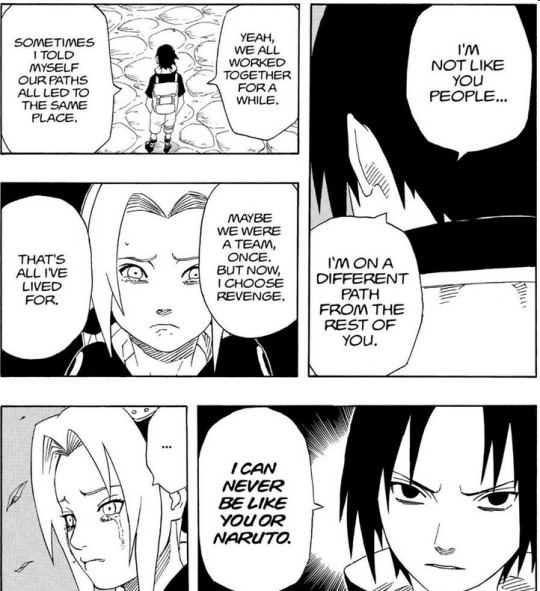
Not just for seeking to be stronger, Sasuke also feels like he doesn't belong to Konoha anymore. Sakura never understood the pain of having everything that matters the most taken away, Naruto never really had anything and Kakashi, the only one who could connect to him, only pushes him away.
1.2. KAKASHI:
Although what people think, Kakashi and Sasuke's relationship was deeper than it seemed. Kakashi was someone that made Sasuke feel safe and vehemently trained him for the Chuunin Exam. In a summary, Sasuke trusted Kakashi and had him as a mentor.
Instead of offering Sasuke the emotional support he needed, Kakashi basically fought him for using one of his jutsu against an ally even though Naruto had done it too and could just have killed him as well. Beyond that, he insults him multiple times and doesn't take his only goal seriously. He tied up the boy to a tree like he was some kind of animal, for God’s sake.
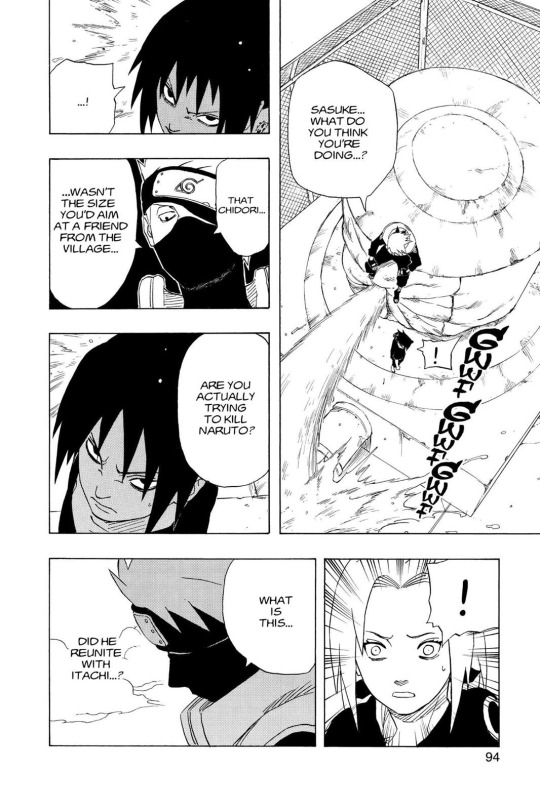
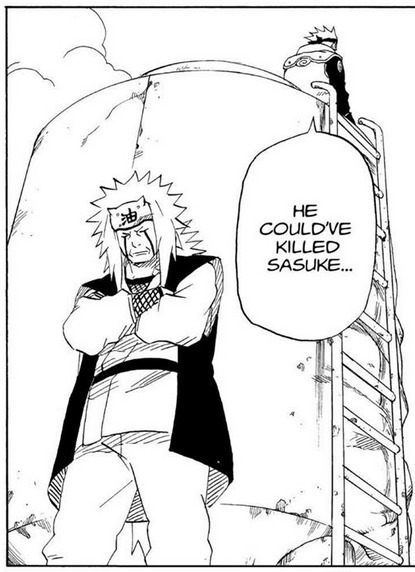
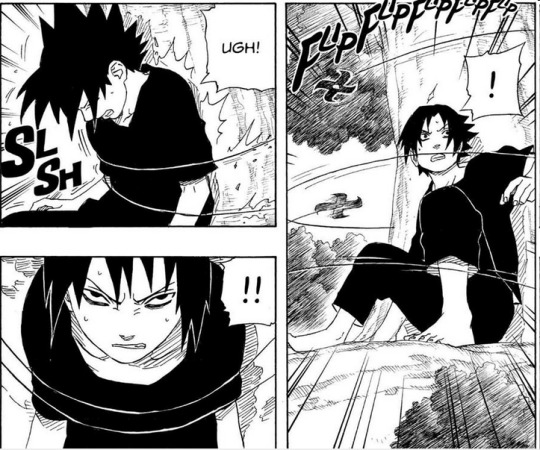
You can read more about Sasuke and Kakashi’s relationship in this awesome analysis.
This is only the beginning of Konoha trying to make Sasuke feel guilty for everything he did and wanted to do, when actually all his hate and thirst for revenge was perfectly comprehensive, since he lost everything to the system he lives in.
1.2. SAKURA:
Besides comparing her pain of losing him with his pain of having his whole family murdered by his own brother, Sakura still blackmails him emotionally because it's all about what SHE wants, about what SHE feels. It only shows she doesn't really understand him.
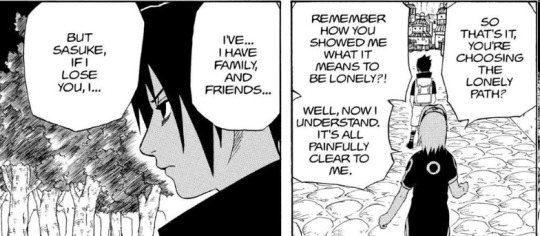
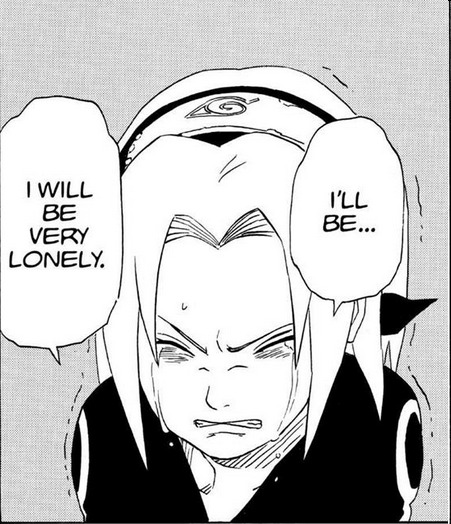
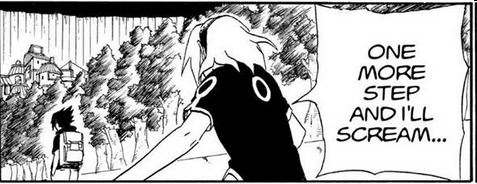
1.3. NARUTO:
Naruto, just like the rest, also doesn't get Sasuke's goals and motivations and tries to stop him from seeking power with Orochimaru, even if he has to "break his arms and legs".
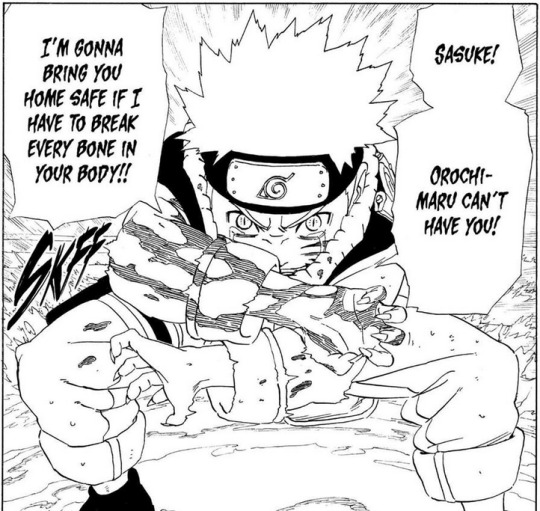
In a summary, the approach of these three didn’t work. Naruto thought he could handle everything with his fists, Sakura thought making it about her own feelings was a good idea, but their lack of maturity is understadable. However, Kakashi understating Sasuke’s pain, like he wasn’t allowed to feel that way because Kakashi himself didn’t (it’s not even the same situation lmao), only made it all worse and was a decisive reason for him to leave.
2. WHEN SASUKE "ALLIED" HIMSELF TO OROCHIMARU.
Besides what everyone thinks, Sasuke doesn't really allied himself to Orochimaru or condoned with his ideology like Anko or Kabuto. He didn't intend for him to possess his body, not before killing Itachi. He wanted to train and get strong.
To this point, Sasuke literally didn't do anything questionable. During training, he never killed anyone or acted as cold as he wanted people to think he was. That's why he says "I'll be merciless in front of him (Itachi)," because that's something he has to force himself to become, not something he is.
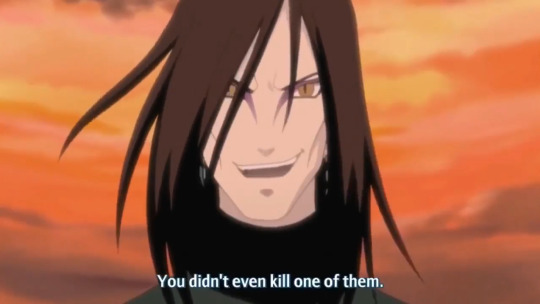
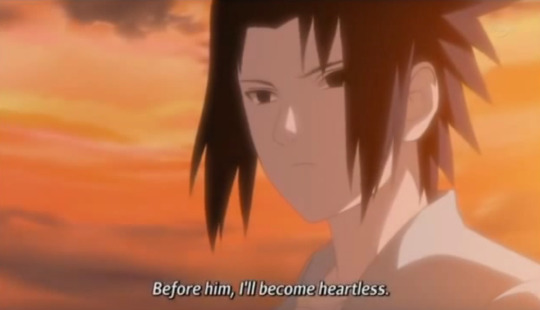
One more proof Sasuke never shared Orochimaru's goals and, instead, used him as a way to obtain more power is his speech before "killing him", where he questions his goals and ways.
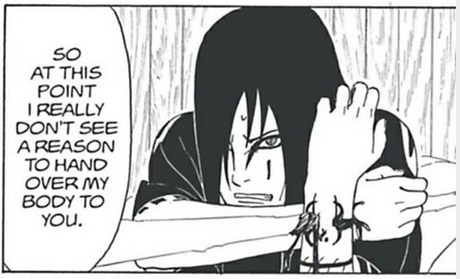
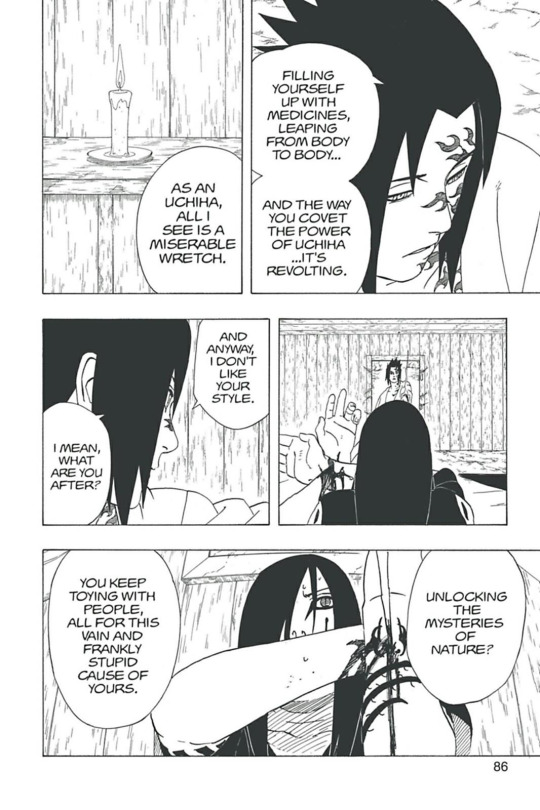
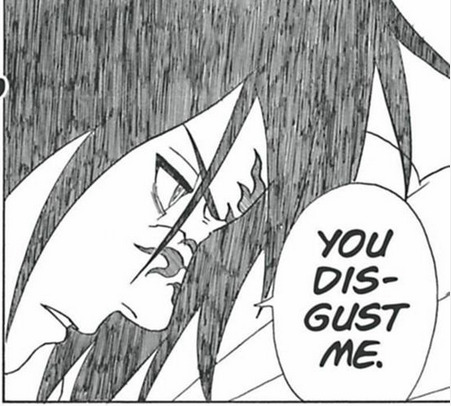
After Orochimaru's "death", Sasuke frees all his prisoners and victims of his experiment, including Suigetsu, Juugo and Karin. In Juugo's case, he offered himself to be his "prison", stopping him from hurting even more people.
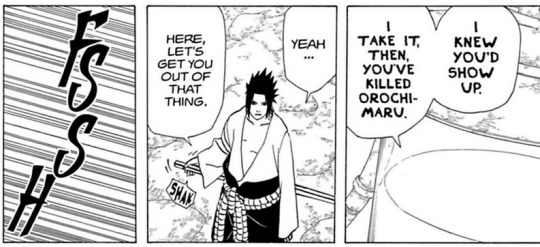
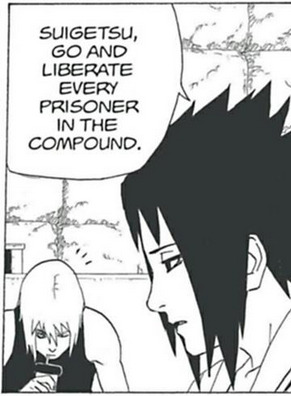
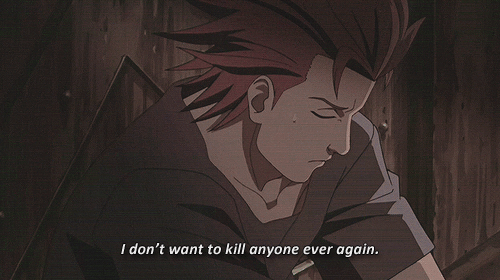
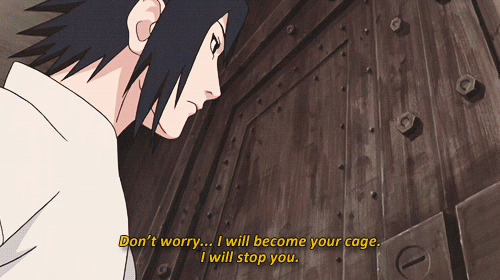
In pursuit of Zabuza's sword, Sasuke prevents Suigetsu from killing just any person.
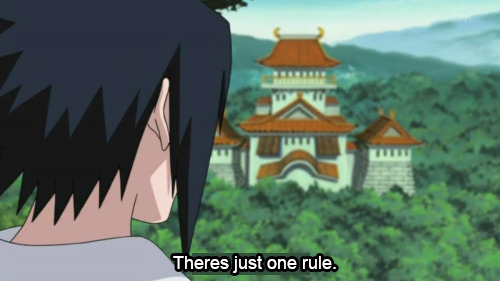
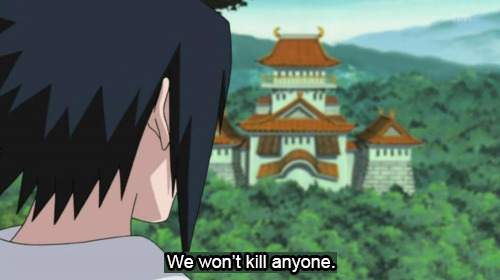
3. WHEN SASUKE LEARNT THE TRUTH ABOUT ITACHI.
This is a crucial point in Sasuke's history because it's where he finds out that the brother whom he always had the goal to kill in revenge actually did everything in order for him to stay alive and become a hero.
At this point, it's important to keep in mind that Sasuke accomplished his lifetime goal, the only thing he believed he was alive for. Many times he said he didn't care as to what happened with his life after that moment, so it is unimaginable the misery and emptiness that he felt. Pay close attention to the expression of his eyes.
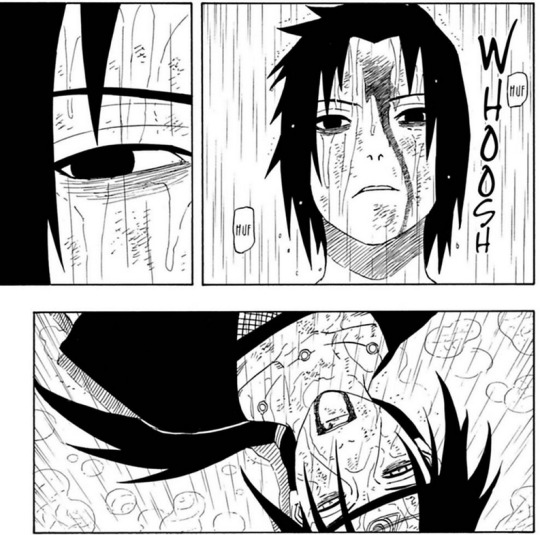
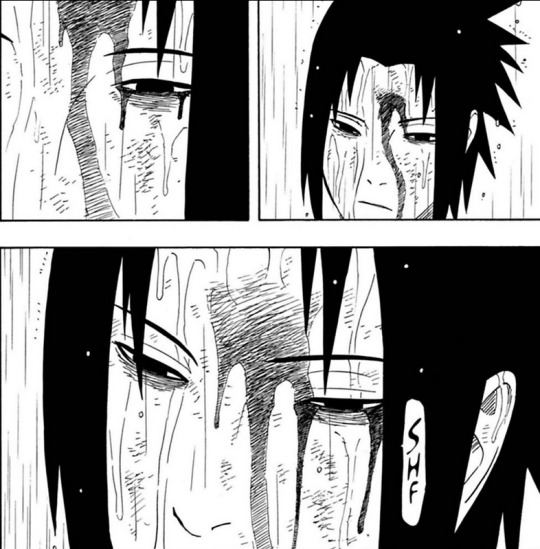
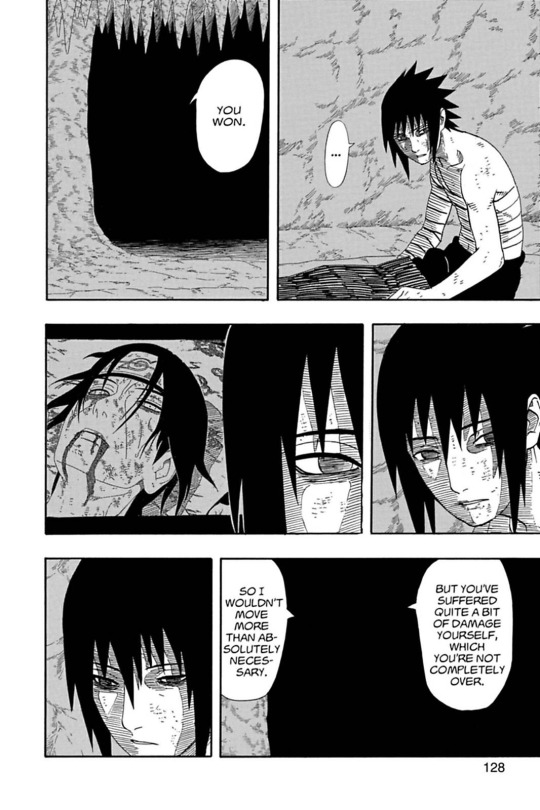
Not even the sight of another Uchiha alive took this expression of pure misery from his eyes. That’s how broken he was at this point.
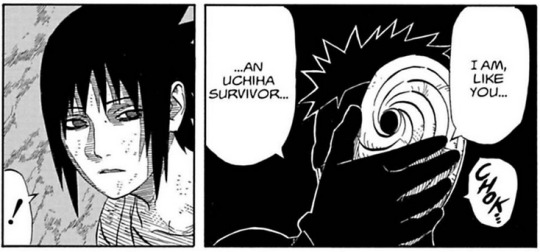
Obito took advantage of Sasuke's mental instability to pour over him all the truth about Itachi. At the minimal possibility of all the acknowledge about his brother and his entire life being a lie, he breaks down, literally blacks out.
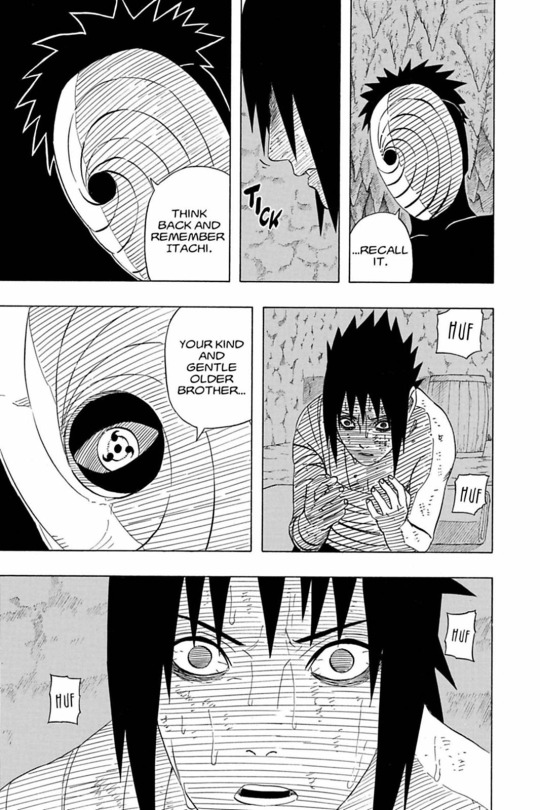
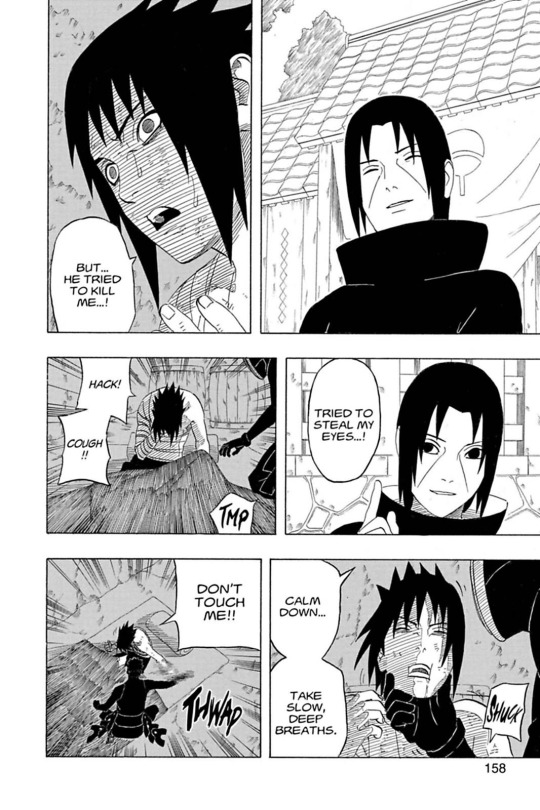
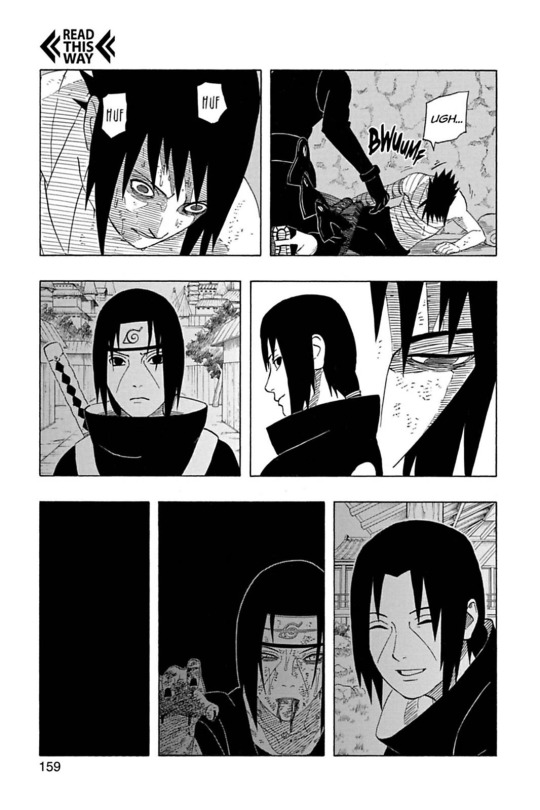
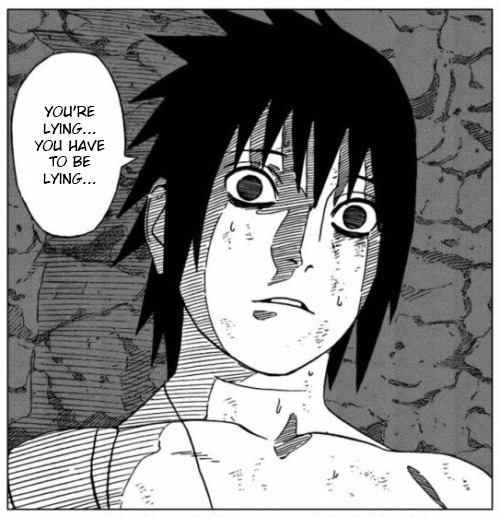
At this moment, there is a giant lack of critical sense from the fandom. Sasuke finds out that Itachi was coerced to do a mission to save his life at the behest of the Konoha leaders. So it's OBVIOUS that he couldn't return to Konoha after knowing the truth.
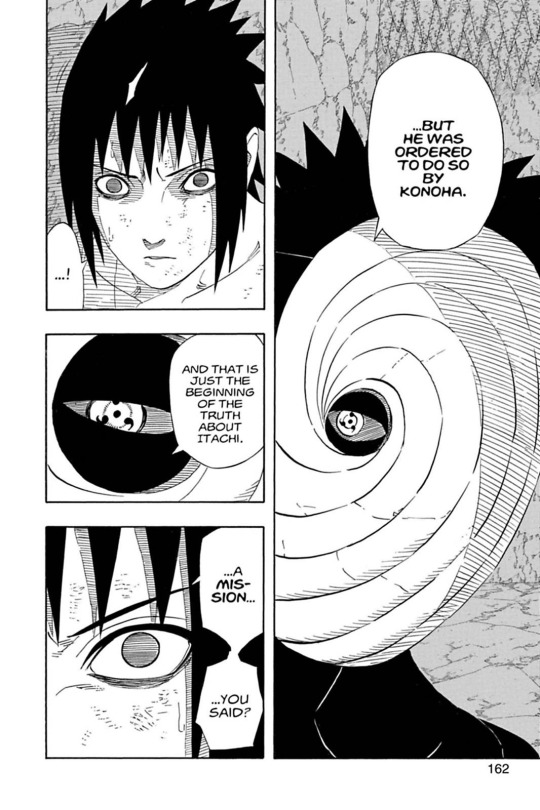
Many think that, since he knew Itachi did everything for the Village (which wasn't exactly the truth because he'd feel doubtful before, but made his decision once Sasuke's life was threatened), Sasuke should, too. But instead, he hates who made Itachi suffer.
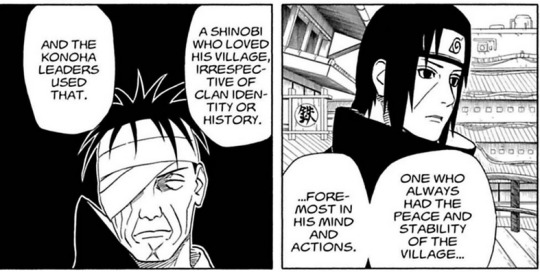
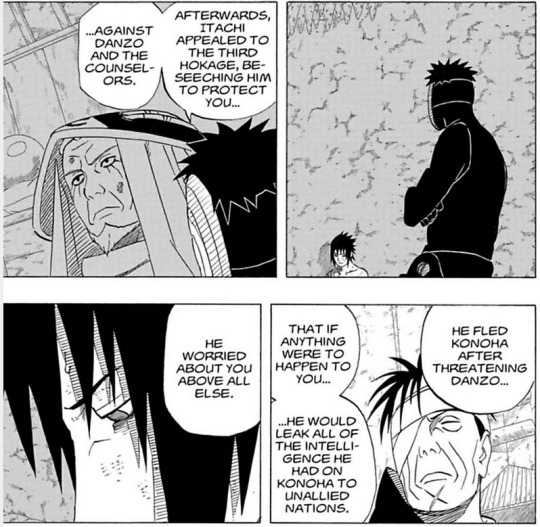
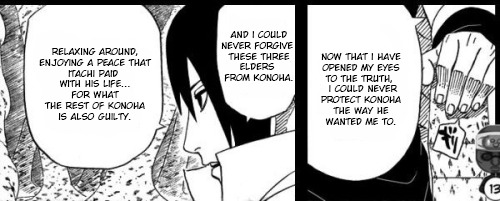
Not only because of his brother, Sasuke hates Konoha for the way it treated his clan, with mistrustfulness and discrimination over one of the families that helped founding the Village.
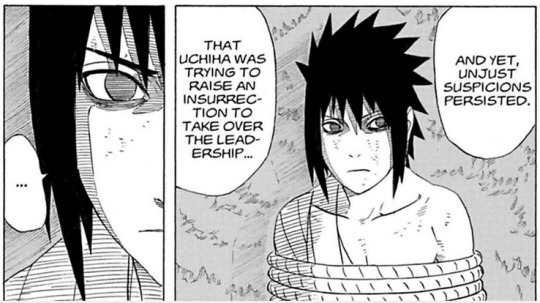
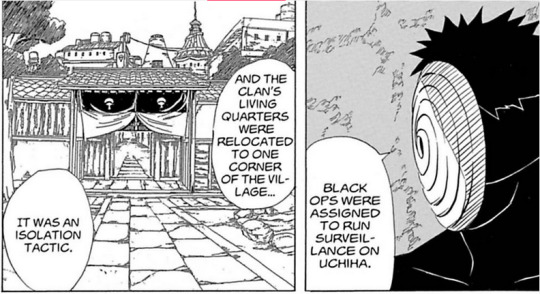
"Even in the middle of the most profound despair, his eyes reflect a single ray of hope"*. That summarises well how Sasuke felt without any perspective of life, but grabbed onto the first shadow of objective that was offered. Obito knew how to take advantage of Sasuke's misery.
*This is a sentence that is written on chapter’s 400 art cover but I couldn’t find it in English.
4. WHEN SASUKE INVADED THE KAGES' REUNION.
Recruited to Akatsuki and manipulated by Tobi, Sasuke made his first move directly against Konoha when he appeared at the Kages' reunion to face Danzou, one of the responsibles for his clan's genocide and Itachi's sacrifice.
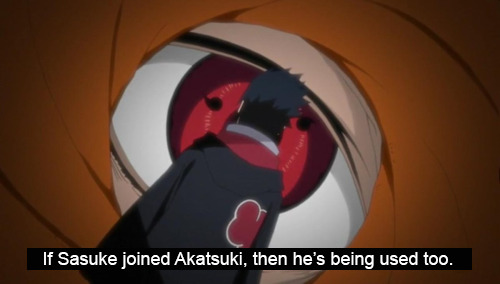
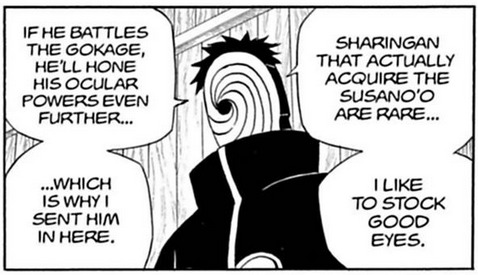
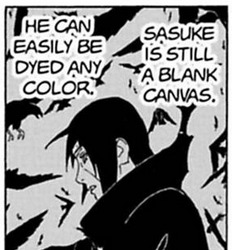
Sasuke's plan was to find Danzou and destroy him like part of revenge against Konoha, but Zetsu alerts the Kages about his presence in the place, which causes everyone to fight against him.
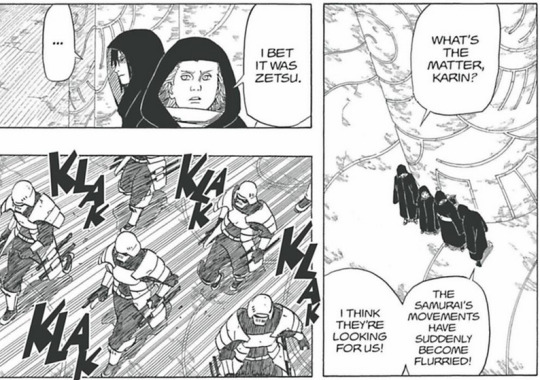
From here on, Taka starts to question Sasuke's sanity multiple times because of the sudden change in his chakra. Gathering all the precious traumas, the guilt for Itachi's death and sacrifice and the hate over who made him go through it, he was on the edge of going mad.
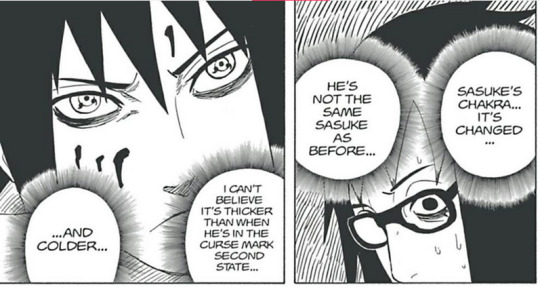
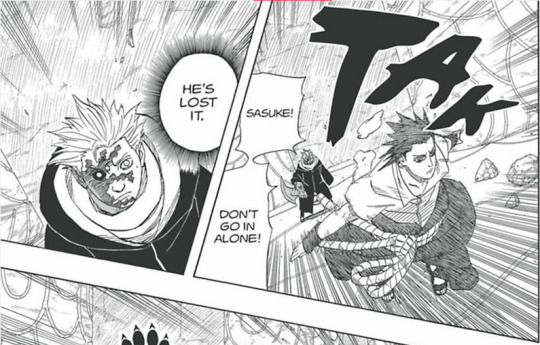
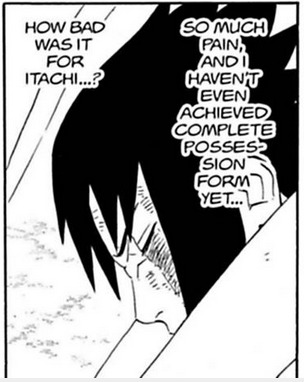
At this point, Sasuke doesn't put anything above his goals. Danzou confirms that Itachi's sacrifice was true and nothing else matters to him, so he kills Danzou and sacrifices Taka. After that, he realises Sakura's intention to kill him and strikes back, trying to kill her as well.
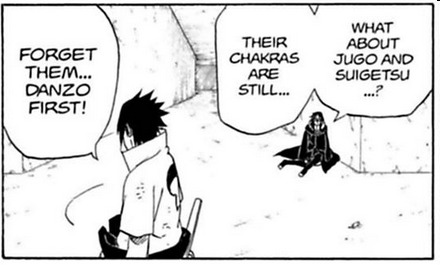
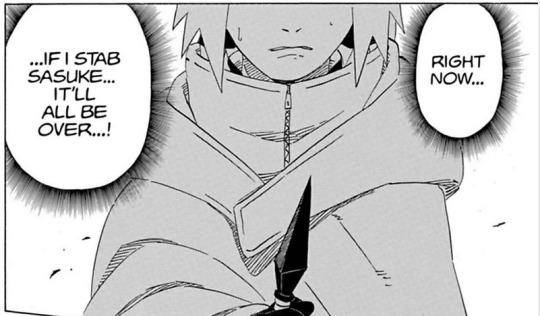
Then Sakura tries to kill him once again, and once again he defends himself trying to kill her back. The same happens with Naruto and Kakashi. So psychologically unstable, he doesn't even care about his physical limitations and insists on keep on fighting blindly.
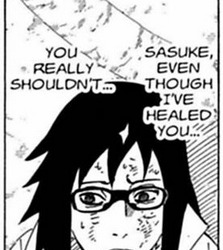
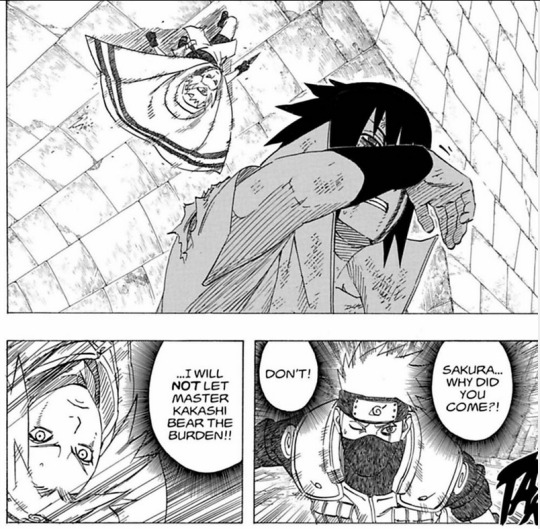
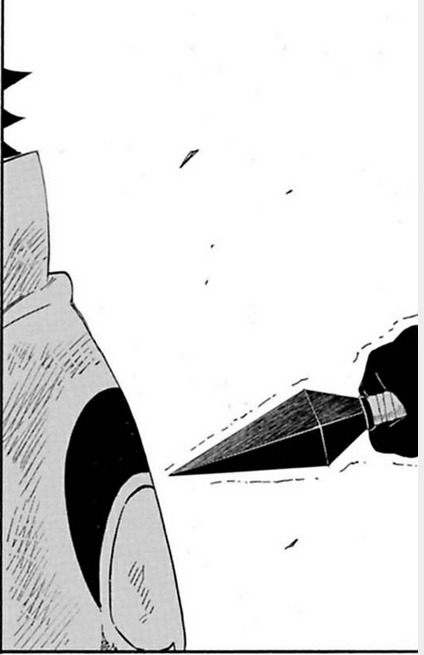
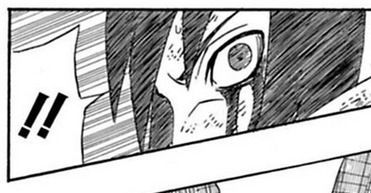
We all know Sakura hesitated but Sasuke didn’t. His sight was troubled and she came from behind. He was defending himself.
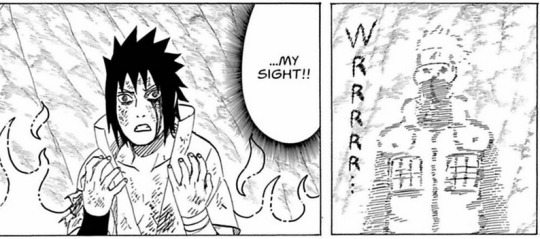
Tobi advising him to kill Karin:
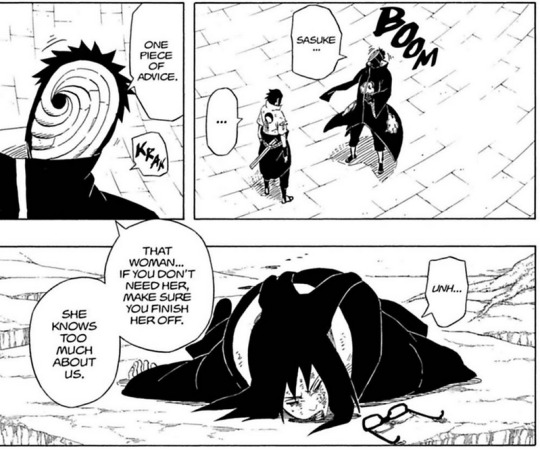
As much as Sasuke was reluctant because he wanted to be definitely full hatred, vulnerable regarding physical strength, he voluntarily decides to hear what Naruto has to say.
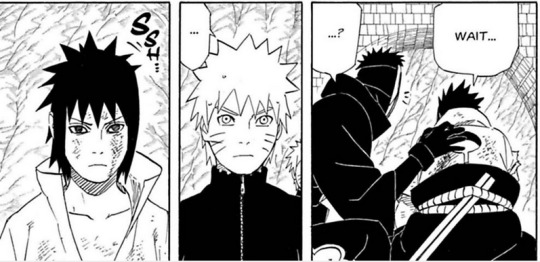
Then Naruto starts the “because we’re friends” talk and Sasuke clearly feels kind of affected because he actually wants that bond so badly but he also wants justice for his brother and clan, about what he’s totally right.
In a summary, besides the declared intention to kill Karin after she was hit because of his shaken up sanity, Sasuke acted in self defense and in defense of his goals, what ended up not killing anyone.
5. WHEN SASUKE JOINED THE WAR.
Sasuke meets Itachi's edo tensei with still profound grudge over Konoha for what it did to his brother. He wanted answers from Itachi in order to confirm everything that was told by Tobi and Danzou.
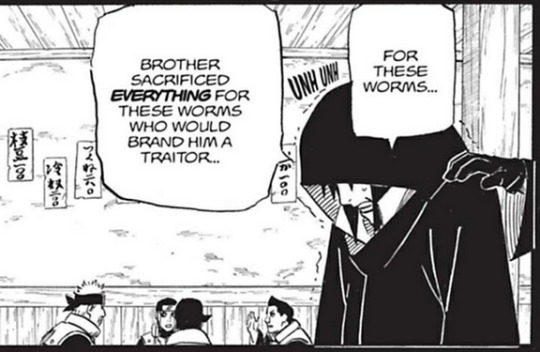
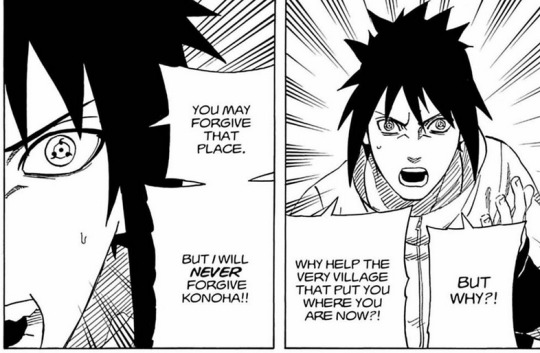
The closer to Itachi he feels, the more Sasuke hates Konoha and wants to revenge his brother for being forced to sacrifice himself.
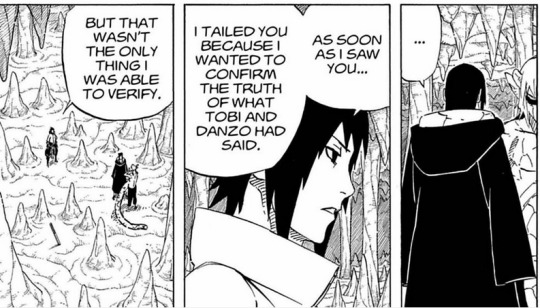
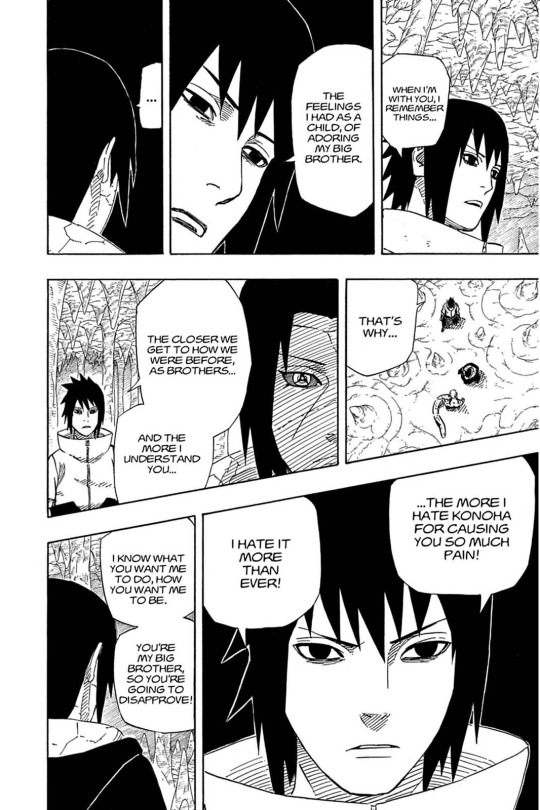
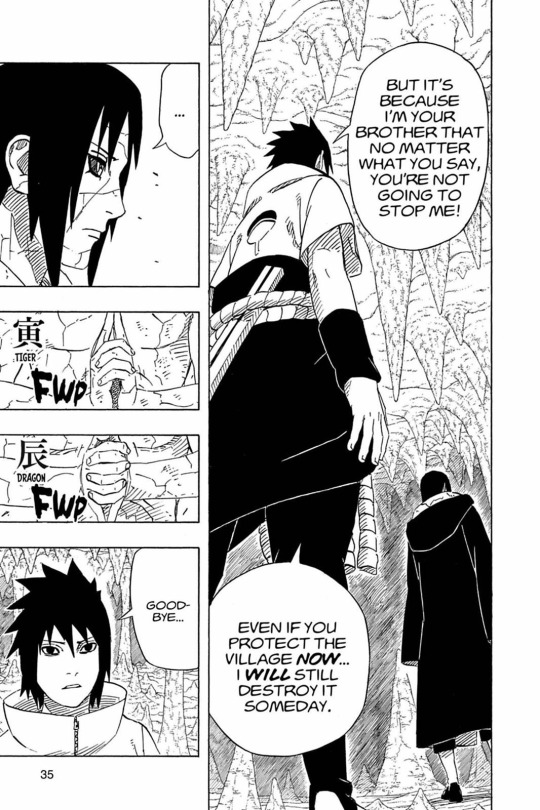
After confirming that Itachi's sacrifice for the village and himself was true, Sasuke falls into an internal conflict for not being certain of any concepts anymore; of a clan, a village, a shinobi, and even himself. To obtain answers, he resurrects Orochimaru to bring the Hokages back to life.
There is a lot of virtue and maturity in Sasuke's decision of understanding all the concepts through their stories. Patiently, he listens to Hashirama's version about everything to then come to a conclusion on what to do about his revenge and himself.
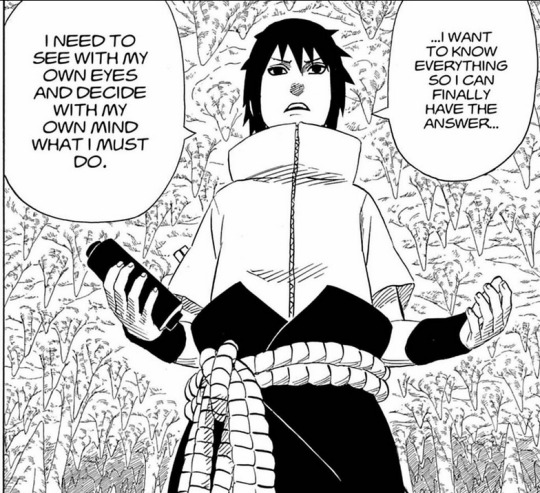
Hashirama talks about his and Madara's trajectory, inwardly connected to the Village's concept, which he had helped found. And allied to the concept of a ninja village, he defined sacrifice as one of the methods to protect it, which Madara stated would drag the Village into darkness, what was clearly a reference to Itachi and the Uchiha's sacrifice, culminating into Sasuke's personal hell. In the end, Hashirama ends up taking the responsibility for this method being considerated valid to protect the Village.
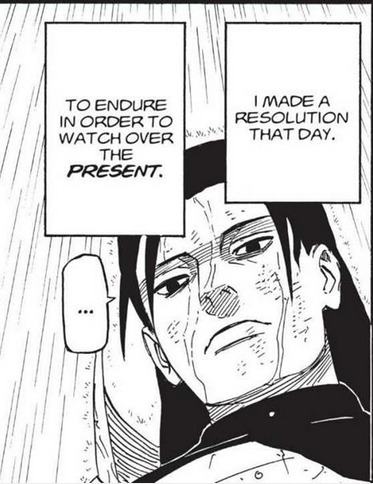
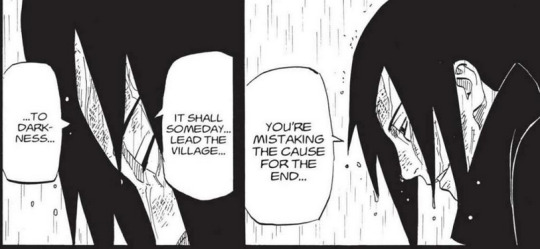
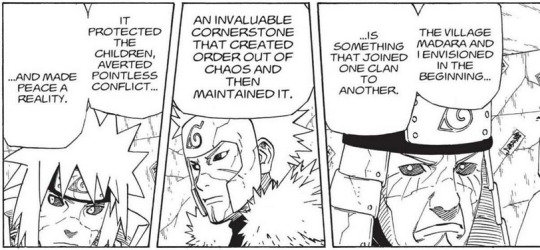
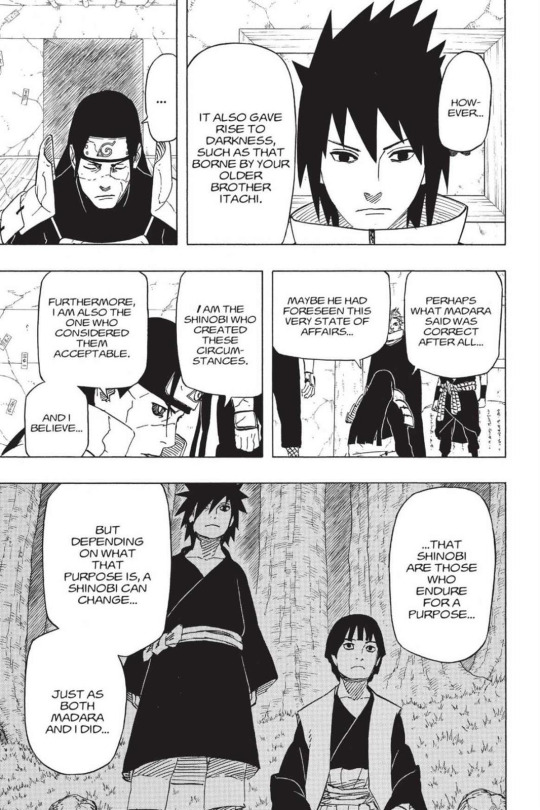
In front of all that, Sasuke, for now, decides to battle next to the Shinobi Alliance so that his brother's sacrifice wouldn't have been in vain. Next to Naruto and Sakura, he seals Kaguya and has an important part in the world's salvage. Without him, there would literally be no way to save it.
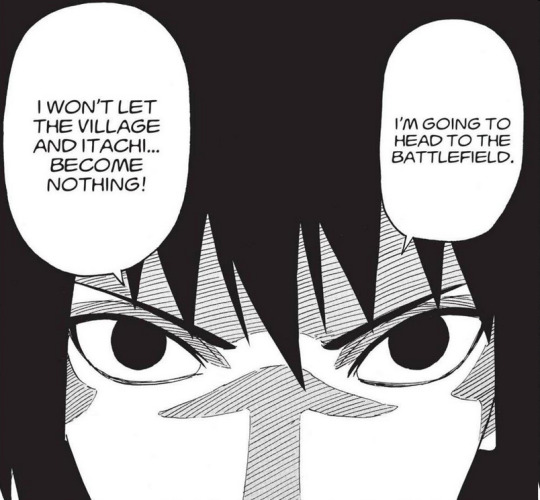
Besides all of that, he still recognised the mistake he made on Karin and asked for her forgiveness.
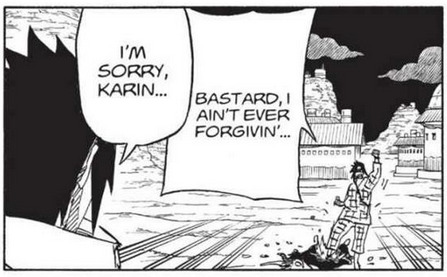
An addendum: SASUKE DID NOT TRY TO KILL SAKURA IN THIS MOMENT like a lot of people try to decontextualise. He put her in a GENJUTSU, the same way Itachi did to himself after the Uchiha's massacre. One more reenforcement to his attempt of cutting his ties with the previous Team 7.
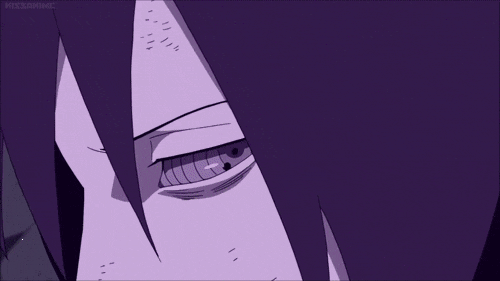
6. WHEN SASUKE BATTLED NARUTO.
To this point, Sasuke comes to an obvious conclusion, but that requires extreme perspicacity from a 17 year old kid: Konoha's problem was its system. The failure that would allow sacrifices like Itachi's to happen was structural.
Even Orochimaru, when resurrected, acknowledges Sasuke's maturing.
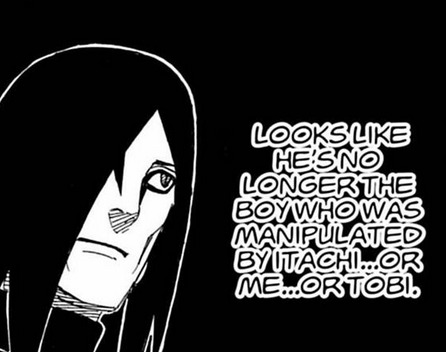
With that in mind, Sasuke decides to become a Hokage and lead a revolution that would change the shinobi system and would nip the world's evil in the bud.
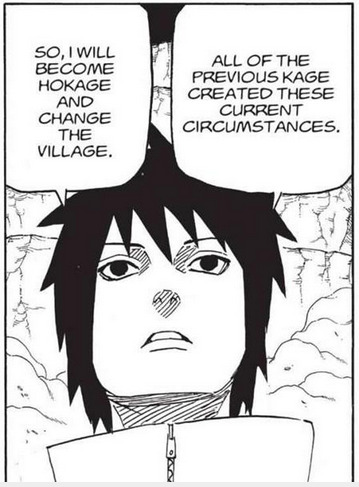
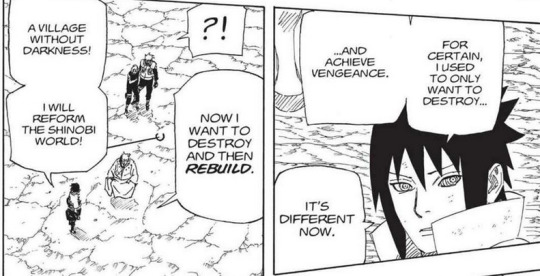
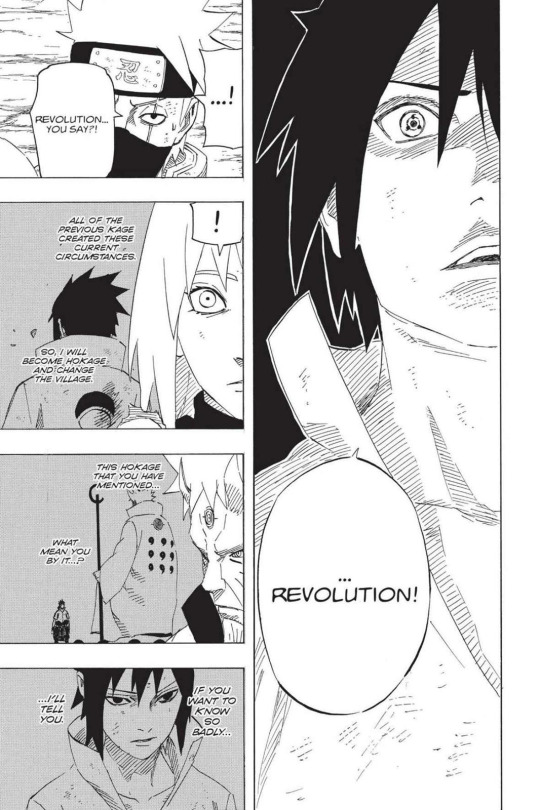
Sasuke's revolution consisted in following Itachi's steps, his great inspiration and influence, sacrificing himself to carry alone all the hate in the world. The intention of it was to unify the whole world and that only he would have to deal with the Villages' darkness.
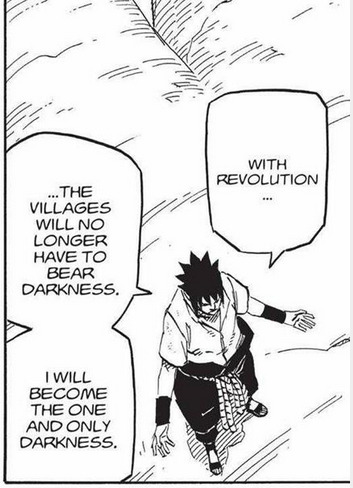
This new goal of him destroys every argument against him that paints him as someone egocentric and selfish. Everything Sasuke wished for was to deal with the darkness by himself in a way that there wouldn't be any more sacrifices like Itachi's or of children like himself and Naruto.
Therefore, as noble as his objectives were and as mature as they sounded for his age, Sasuke sins on the chosen ways to start his revolution (even though I wouldn’t mind if he killed the kages whereas all their war crimes). Still, it's comprehensive since he started using Itachi's example as a guide of his actions.
Sasuke then apologised for all the suffering he caused his friends, even though it wasn't really his fault. He felt so responsible for the bad events that he left on a redemption trip to see the world with his own eyes, proving his maturity once again.
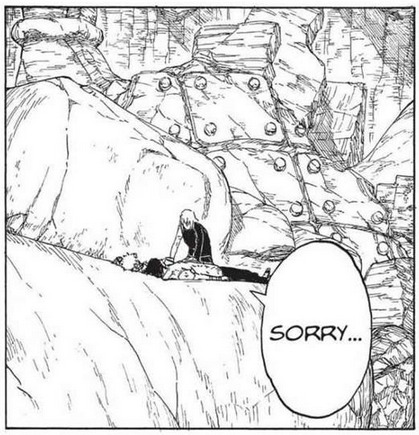
7. WHEN SASUKE LEFT ON A MISSION.
I want to start this section saying how much I despise for personal reasons (it’s explained at the end of this meta) canon adult Sasuke for what Kishimoto did to his character but I defend him anyway because he’s still hated for absolutely wrong reasons.
Apart from everything he went through previously, Sasuke was brainwashed accepted the position of shadow Hokage and started to protect Konoha even if the village never had redeemed itself for its crimes against his brother and clan.
He sacrificed almost an entire life next to his wife and daughter in favour of not only Konoha, but the world, since he was the only one who could track traces of Kaguya thanks to his Rinnegan. In the meantime, he saved the village again and again.
Sasuke is constantly judged for pointing out a sword in Sarada's direction on their first meeting, although there wasn't how he'd know that, out of all people, she would be there (thank you Naruto you’re so responsible, no wonder you’re such a good parent lmao) considering there were sharingan user clones walking around.
Anyhow, he saved his daughter when it was needed and searched for Sakura to guarantee her safety, even though he had defended that she would be fine since she was as strong as him and Naruto. Besides, he AGAIN helped saving everyone.
FINAL CONSIDERATIONS & PERSONAL ANALYSIS.
Sasuke was a child that had everything and lost it all in the most traumatising way possible to the person he loved the most, ordered by the Village he grew in. He saw his family BEING SLAUGHTERED thousands of times in Itachi's genjustu when he was just a kid.
He had his only goal ripped from him on his teen years when getting rid of the target of his revenge only to learn that he actually had sacrificed himself on HIS BEHALF, since his LIFE WAS THREATENED by the superiors responsible for Konoha.
Although being a completely traumatised child and psychologically shaken up, being manipulated by his brother first, then by many others who only wanted to take advantage of his abilities, Sasuke still became aware of the world enough to want to change it for the better.
The revolutionary ideals that conferred depth to the character and made him promising were devastated because antagonists are portrayed as "insane", "out of their minds", "dominated by hatred" so we'll think the revolution of systems is a crazy people thing.
Sasuke was a victim of the system that allows 13 year old children to kill their families in sacrifice of a "greater cause", like this kid and theret family weren't part of who deserved protection. If he had controversial actions, Konoha and its system are the ones to blame.
The real guilty ones are Tobirama, who SEGREGATED the Uchiha without a reason; Hiruzen, that didn't have any tact or pulse to deal with Danzou and the Uchiha; and Danzou, whose crimes I don't even have to mention because they're common sense. If you want to blame someone, these are the ones.
Even though the real guilty ones were previously mentioned, Sasuke was thrown in jail and still got scolded by the greatest Sixth Hokage, his said mentor, who told him to "try not to go mad again", like it was his fault for being traumatised thanks to the Village.
And that's why I hate the ending of my favourite character. It has nothing to do with some kind of ship like many may think (even though I’d much prefer him to end with someone who could really understand him), but because he was distorted to fit in a stupid and conformist narrative, when he had a marvellous potential as a character.
And as if it's not enough, he's hated and made fun of in the fanbase, even though he's the only one, among the kids, to really make sense, even with all the traumas he suffered. Even when he had proved not to be selfish, or dumb, nor egocentric or a terrible father or an abusive husband and etc.
Sasuke Uchiha did nothing wrong and I just proved it. If you, a possible anti who read it all the way here, still want to keep in the ignorance of hating the character based on his actions then that's on you. I've done my part. That's it. Now go love my baby cause he deserves it. ♡
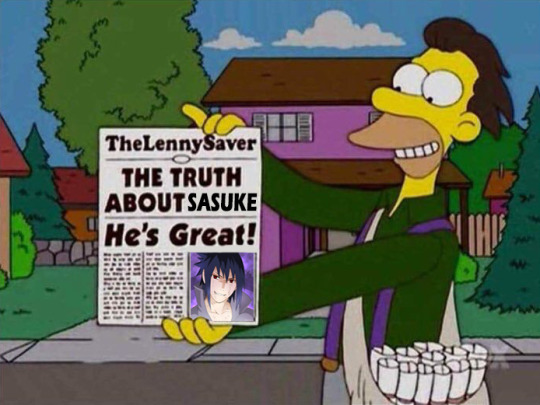
I couldn’t get to all of these opinions without help, so I’m recommending some important pro-Sasuke posts (besides the ones I already did during the post).
Sasuke changing the shinobi system thread.
About adult Sasuke.
Sasuke’s “crimes”.
Sasuke’s protectiveness 1 and 2.
Anti SasuSaku fandom.
Naruto’s feelings for Sasuke.
The Fucking Will Of Fire™.
Why pro-Sasuke people are pro-Sasuke anyway?
Anti-SNS.
Sasuke’s guilt trip.
pt-br twitter thread / pt-br tumblr trans
#sasuke uchiha#pro sasuke#meta post about sasuke#pro uchiha#pro itachi#anti ss#anti sns#anti naruto#anti hiruzen#anti danzou#anti tobirama#anti kakashi#anti konoha#anti shinobi system#anti naruto ending#i spent hours and days preparing it#i hope it helps to save some antis' souls#mine
181 notes
·
View notes
Note
what did you think about fitz' death not getting the weight/big moment it deserved? like i get it that coulson is "retiring" and everything but i felt so played when they revealed none of the honour/remembrance/plaque/feels were for fitz... like "we got a copy of him out there, lol, who cares about this one".... sorry to dump this negativity on you i just felt they played us so dirty...
I have kinda… mixed feelings about it tbh.
On the one hand, the scene with Mack was absolutely soul destroying. It was a little understated, which was nice esp as I felt a lot of the dialogue had really Grand Vibes this ep. I’m glad this scene didn’t. It was quiet and shaken and scared and there was a really powerful silence when Mack just sat with him. It was a really beautiful scene. I cried.
So, I’m kinda glad they didn’t drag it out? Aside from the very genuine, heartfelt emotional punch of that scene being quite poignant imo, and not really needing more (given that it’s a narrative, I would happily read 500 ‘jemma finds out’ ‘daisy finds out’ ‘let’s rip clara’s heart out some more’ fics), I felt like a lot of Coulson’s speech was very grand and sweeping and finale-esque, but it didn’t feel that genuine to me. It was similar to in the S4 finale when they sorta handwaved and were like “yeah we all did bad things in the Framework, it sucked” rather than acknowledging Fitz’s unique victimhood status in that case. So I’m sorta glad that didn’t end up being for him? Although I coulda done with the plaque in the cockpit of THE ZEPHYR. THE PLANE THAT HE BUILT. (i have a lot of zephyr feels okay). then again it probs would be hella weird for cryoFitz to come back and have a constant reminder of the fact that he’s like, dead.
We also imo didn’t need / did well without consecutive mourning scenes when they were going to reveal cryoFitz all along. Some people are already extremely pissed by the unnecessary death itself; showing and going through all that pain, from that perspective, for in the end ‘no reason’ is even more wasteful, unnecessary and cruel. Then again, it depends how you feel about the Fitz/CryoFitz thing. My feelings on that again are quite complex unfortunately but some thoughts on it include:
CryoFitz isn’t a clone of Fitz or something, he is actually Fitz. He’s not “not real Fitz” in any way shape or form, he’s literally Fitz, just further back in time (and not by much!). The main things he’s gonna miss out on are: a) a hell of a lot of bad/dark shit which at best, he could do without and at worst, was atrocious writing that never should have happened anyway and b) the FS marriage and proposal which in my opinion, weren’t really ideal anyway. I get why a lot of FS fans are pissed at this being erased, because they are often considered milestones in a relationship, and a lot of FS fans were understandably highly attached to them, but I just haven’t seen them this way in this particular case. Both the proposal and the wedding were stolen moments in the middle of a war-zone, which were sweet and served their purpose and all, but they didn’t move the actual contents/nature of the relationship forward (in my opinion), and I think it will be more meaningful to have the chance to do them again, to do them ‘right’, and to do them with the chance to follow through with the promises they made, like (even though I don’t love this, I’ll live) starting a family with each other. So I actually think that’s kinda a good thing in that regard.
What I’m more annoyed about than the lack of mourning and such per se are two things:
1) I’m annoyed that Fitz died in a freak accident - he’d already saved Mack and Polly when the roof fell in. The loop was already broken. I don’t really see why it was necessary. If they really wanted to kill (or ‘kill’) him, they could have done the exact same death scene with say, him pushing someone out of the way or something and directly having an impact on the future. This way it ended up being much more of a ‘because we could’ situation and that’s pissed a lot of people off, and the way the writers talked about it seems to be in line with that interpretation, with them basically saying “it was a way of giving you the full emotional impact of a death without actually giving you a death” which a) no it wasn’t because we had 1 mourning scene and then ‘it’s okay bc cryo Fitz’ which spoils that impact and b) FS separation #1135013613704 is not exactly inventive and I can see why lots of people are pissed at that.
2) I’m annoyed - and I freaking called this I called this so hard #disappointed-but-not-surprised - that this is a chance for them to erase and start over. They did redemption by death AND redemption by time travel both at once! There’s almost no way they’re going to give 5x14 any kind of resolution between Fitz and Daisy now, because that Fitz died and Fitz-now didn’t do it so it’s not fair to hold him to account. But that means Daisy has to forget her trauma. Plus, it’s been so long in the storyline since the Framework that I have a very strong feeling that isn’t going to get addressed either, even though cryoFitz is fresh outta 6 months of solitary outta the FW and not in a good place. To me this shows that they did all this to/with Fitz because they knew they could snap their fingers and get out of it later. That pisses me off. It also means that once again, they get to handwave others’ trauma based off things that Fitz and/or his face and/or brain was used for. That’s the more disrespectful element to me.
Plus, I guess to be brutally honest, the writers kinda killed “my Fitz” earlier this season. CryoFitz is closer to my Fitz than the Fitz that died. Not just because of his darker character development, I don’t want to just whinge about my Poor Baby Fitz going through things, but because of some decisions that I stand by were downright bad, insulting, ableist writing (*cough* 5x14 *cough*). One of the reasons I was so affected by Fitz’s death scene was because it was My Fitz that I saw dying. Shaken and scared, but trying to solve it, and trying to save the others, and trying to have hope. That is my Fitz and for a second it made me forget about all that’s happened with him this season because all I saw was My Fitz dying and needing his friend and it broke my heart in a way that was actually kinda cathartic. So I’m not really annoyed by how the death was handled, because I would actually be a huge fan of erasing most of S5 on Fitz’s behalf (and bc Iain and Henry forking killed it), but I am annoyed about how that will be used.
#for the record: I also really wish they hadn't killed talbot but again i'm not surprised#leo fitz#aos wank#negativity#aos s5#aos spoilers#ask me stuff#aos 5x14#aos 5x22#Anonymous
27 notes
·
View notes
Text
Winter 2017 Anime Overview: The Ancient Magus Bride
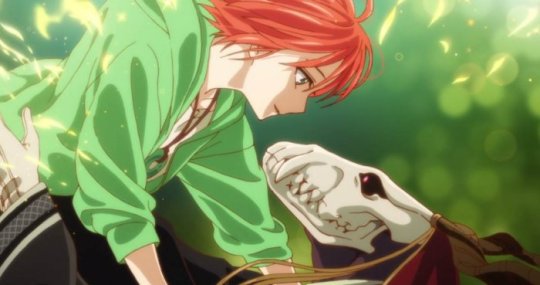
This is an anime that’s still in progress, so keep that in mind as I review it...it’s continuing on into the winter 2018 season.
The Ancient Magus Bride follows a young girl named Chise, whose ability to see supernatural beings has caused her so much trauma she volunteered to be sold as a slave to the highest magical bidder. She’s purchased by Elias, a hulking mage with a scary skull face, who declares that he will take her on as his apprentice...and bride (he doesn’t seem to realize what the latter term really means, though). Chise begins a journey with Elias where she learns more about her power and the world around her and slowly gains a better understanding of herself.
The world if the Ancient Magus Bride is intriguing and beautiful immediately- celtic and european folklore is woven intricately and smartly into the setting. The visuals and atmosphere of the show is truly striking (the animation is even more beautiful in OVAs- which I’d definitely recommend watching, they’re available on Crunchyroll with the rest of the series and can be enjoyed as a standalone story).
Chise immediately caught my interest too- it was clear she had suffered a lot of trauma, and the show started to dig into what makes her tick little by little. Elias is also a compelling figure- both sympathetic and suspicious, a lot of mystery hangs around him and it’s clear he’s still learning to be human. He and Chise have a truly strange dynamic and their relationship is still in very early stages.
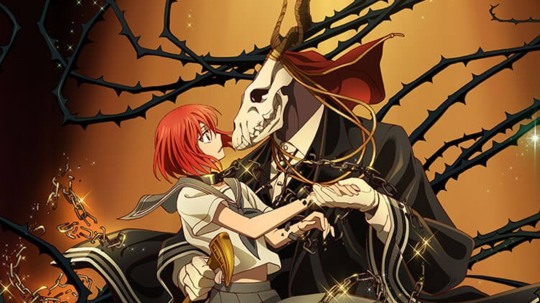
But while AMB is immediately intriguing, it’s also immediately uncomfortable, and it takes quite a while (like six to eight episodes) for the show to begin exploring and addressing those uncomfortable aspects. I can completely understand how people got frustrated with that- I did a little as well. The fact that Chise was bought by Elias can’t really be overlooked and the whole situation between them is immediately several levels of alarming. Chise is clearly an abuse victim, so she’s willing to go along with whatever Elias does, and immediately feels beholden to him when he shows her the slightest bit of acceptance and kindness. Meanwhile, Elias declares the young, vulnerable child in his care will be his bride- when she wants to, and she will want to- which reeks of grooming. He calls her “his puppy” and is immediately pretty possessive. He even undresses and bathes her without asking (in a very quick and understated first episode scene, he’s later called out on it, though arguably not harshly enough).
The only thing that softened this was the fact Elias was not human, and it was clear he didn’t really understand how human interactions worked. I suspected from his attitude he didn’t even understand what “bride” actually meant, and that was eventually revealed to be the case. But the show took its sweet time doing this. In the meantime, there was lot of uncomfortable romantic hinting, complete with Chise blushing at the thought of them having children.
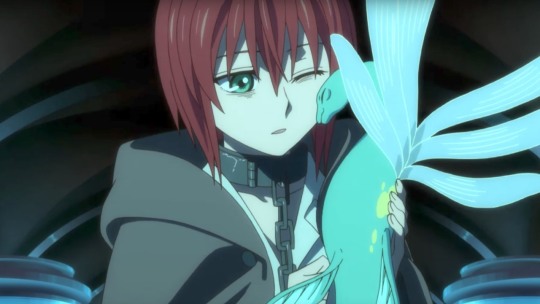
But I kept at it, because the whole “fucked-up fairytale” atmosphere of the show made the whole thing somewhat more palatable and because this fantasy world was truly enthralling, and I was very curious to learn more about it and about Chise and Elias themselves. And finally, the show began to acknowledge Chise’s codependence, had her ruminate on how Elias isn’t very trustworthy, and made it clear Elias didn’t really get humans and thus probably didn’t actually have romantic intentions (right now, at least) and that everyone was aware of how messed up the situation was. The other adults in Chise’s life also actually took her to stay with them a bit so they could talk with her and make sure she was okay, which was good.
The glimpses into Chise’s psychology were also fascinating- she has a rough past and a tragic and complicated relationship with her mother to deal with, and she has sucidal tendencies that still linger. Now she’s started her journey of healing and recovery and is starting to gain some self confidence and beginning to question why she is so willing to be used by others. Her flashbacks and panic attacks broke my heart. I can’t wait to see her grow and she’s already a great character, and it’s nice to have a story focusing on a female character dealing with her mental illness and trauma while finding her power. So far, she’s discovering her self worth not mainly because of Elias, but thanks to to support of ALL the friends she’s made and the ways she’s been able to help people. And that is absolutely excellent.

But again, pacing is a problem, and the umcomfy parts really drag. Then episode 8 had the opposite problem and had way too many things happening too quickly. The show seems to have settled with its pacing now, but it was definitely an issue. (One person I saw reccomended maybe watching the OVAS and skipping the first six eps of the anime because of this- I’m not sure how that would work, since I honestly found the OVAs a little confusing, but it’s a thought)
Other things to warn for: there’s a flashback storyline that involves a man relentlessly butchering cats and it’s a bit graphic, and also one of the antagonists in the series was Cartiphilus (also known as “the Wandering Jew”). He’s a genuine legendary figure, but also one that has been used to justify a lot of anti-semitism, I’m told. I think the author was likely just doing her thing and using figures from mythology and I don’t know much about the whole deal, but I totally get that it’s an issue so I figured I’d warn for it. There’s also the occasional weird big boobs money shot with some of the supernatural beings.
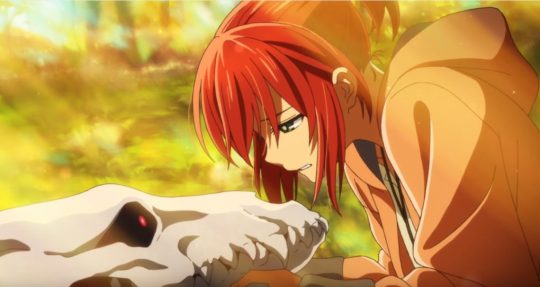
For all its potential issues, The Ancient Magus Bride was one of the shows that hooked me the most this season. The rich tapestry of fantasy it wove, the breathtaking scenes of magic and mystery and the fact Chise and Elias are two of the most intriguing characters to be introduced in anime this year are huge draws. The varied cast of creatures and characters and great design really boost things too. It’s a detailed and thoughtful series. The show has the makings of something really special and I know the source material it hails from is considered very strong.
I look forward to seeing this complex world unfold and these characters grow. I also look forward to seeing Chise learn her own worth as a person and how to value herself, as she has already begun to. Ancient Magus Bride certainly has a kind of magic about it, and I am well on my way to being enchanted.
#the ancient magus bride#mahoutsukai no yome#mahou tsukai no yome#winter 2017 anime#anime overview#my reviews#abuse cw#suicide cw#fall 2017 anime
50 notes
·
View notes
Text
Why this Netflix Original is the Bonnie & Clyde of our generation
Our new rebels without a make
Image: netflix
Millennials seem to vacillate between two polarizing #moods: unspecified rage, and a seemingly psychopathic disassociation.
That’s what James and Alyssa, the teen produces behind Netflix’s new dark slapstick series The Terminate of the F *** ing World , symbolize. Their persona of unbridled fury and panicked dispassion are quickly revealed to be the defenses of two deeplies traumatized brains.
But, like, same.
The two protagonists, like many millenials, hide behind whatever person they tell themselves they find themselves. So tough, fearless, cussing Alyssa can pretend she’s not actually a powerless child inside. And James doesn’t has to be acknowledged he seems nothing, but merely because he feels so much that he can’t endure any of it.
Engulfed by an era of unprecedented change, anxiety, and uncertainty, Alyssa and James exemplify our generation’s struggle with liberty — whether we’re fighting for it, or being utterly clueless when we get it.
youtube
The Objective of the F *** ing World em> is as electric as it is understated, with writing as beautiful as it is plain. It never fails to astound, but preserves an acute appreciation of friendlines. Like its two unconventional heroes( played by the impossibly likable Jessica Barden and Alex Lawther ), the story of a would-be teen boy serial killer and lovesick runaway is tragic, but not in in accordance with the rules you think.
This is an apocalypse, as the name promises.
The show sells itself as a black humour murder mystery. It is, but in the same unorthodox lane that TB’Ss Search Party is. There’s no whodunit to the murder propelling the plot forward, so intrigue is replaced by a nervous fright. Inverting the traditions of assassination whodunit, the real victims of the crime are likewise the murderer. Their violence feels like the most human response to the barbarism “the worlds” inflicts on them.
SEE ALSO: The Netflix original horror movie you haven’t is aware of — and you need to watch
Balancing on the tightrope between expectancy and current realities, you’re engulf in the experience teenaged uncertainty. The huge difference between what is said, and what is thought through James and Alyssa’s inner monologues captures the schizophrenic psyche of a youth culture that seems adrift. Vilified. Fucked. Lost.
Millennials seem so damn sure all the time. We insist aloud and proudly that we commit no fuckings, or self-diagnose ourselves with every manner of mental illness to try and explain why we feel so aimless and empty. We broadcast everything, sharing our personal lives with the entire world, but nobody knows us.
Until, against all odds, person does.
That’s what stimulates Alyssa and James perfect equivalents to the Bonnie and Clyde of our generation. From the 1930 s through the 1970 s, the murderous It Couple propelled to some deep part of the cultural consciousness. The public’s fascination with them had little to do with the actual crimes or historical figures, since both were glamorize beyond recognition.
James and Alyssa, operating from a garbage fire world
Image: netflix
But as icons, they appealed to the scarred soul of a generation trying to be dealt with everything from The Great Depression to WWII and even Watergate. Bonnie and Clyde were the ideal image of sexy rebels( crystalized by Arthur Penn’s classic 1967 film) raging against a rigged establishment by violating every social regulation to get what was theirs.
You can imagine why they were beloved by a population that had abruptly lost all faith in the institutions that’d promised them safety, security, civility — before throwing them to the dogs.
Like Bonnie and Clyde, Alyssa and James are outsiders. But unlike Bonnie and Clyde, Alyssa and James are far away from idealized career crooks. They’re children, awkwardly stumbling ass backwards into becoming outlaws. Instead of revenge, they seek a purpose. And their haphazard route to high bets criminality is paved simply with the best of intentions, and hilariously amateur mistakes.
Where previous generations required glamorized insurrection, millennials crave an honest reflection of being caught in a permanent government adolescence. Fumbling to find their place in the world, Alyssa and James are desperate to understand who they are, comprehending for any semblance of stability or connection.
SEE ALSO: Why surprise Golden Globe nominee ‘The Sinner’ is a must watch
The villain persecuting Alyssa and James isn’t really the law, either. In reality, the specific characteristics most empathetic to their plight is a government agent tasked with catching them. No, the real foes in The Aim of the F *** ing World em> are the mothers. The people who — either through incompetence, negligence, mistreat, or absence — failed to prepare them for the world.
Millennials never truly had faith in the adults running institutions, be it the police or school teachers. But we needed to believe our mothers had our best interest at heart. And ultimately, we seem most betrayed by the people closest to home.
Because, sure, the real source of our millennial plight comes down to economic refuse. And yes, it’s mostly the media blaming us for ruining everything from avocados to adoration. But who do you think caused that economic clusterfuck we inherited? And who’s scapegoating us at the dinner table for the rapid changes of a modern technological world?
Extreme same
Image: netflix
Our parents were the ones who were supposed to protect us, protect us, commit us answers. But at the worst they imparted trauma, or at best misguided principles. Like the generation before us recognizing also that the people in charge royally screwed them over, we’re still trying to reconcile given the fact that mom and dad aren’t coming to save us.
“People can’t be answers, ” Alyssa imagines to herself after turning to her parent for help. “They’re just more questions. Topics like, ‘Why are you such a fucking useless papa? ‘”
The Purpose of the F *** ing World carries the restless, enraged ethos of an entire generation on its slim adolescent shoulders. But it does so by zooming in on the very human collateral damage that is the cost of our societal unrest.
You might be seduced to disregard the series as merely another angsty teen drama. But I dunno — perhaps we should start listening to what our kids are trying to tell us?
The End of the F ** king World is now streaming on Netflix
WATCH: The Netflix original fright movie you haven’t heard of — and you need to watch
Read more: https :// mashable.com/ 2018/01/ 29/ end-of-the-fucking-world-netflix-original-bonnie-clyde-review /~ ATAGEND
from https://bestmovies.fun/2018/02/01/why-this-netflix-original-is-the-bonnie-clyde-of-our-generation/
0 notes